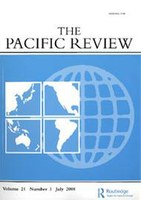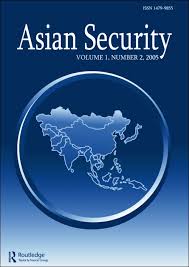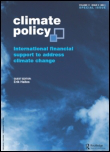Publikationsauswahl
Peer reviewed journal articles in English language
Carmody, Pádraig, Zajontz, Tim and Reboredo, Ricardo 2022. ‘From “debt diplomacy” to donorship? China’s changing role in global development’, Global Political Economy, online first. https://doi.org/10.1332/UZHW7185.
Since the mid-1990s the Chinese state and the country’s businesses have significantly increased their activity throughout the Global South. In International Development, China’s impacts on this varied meta-region have generated substantial interest in recent years due to their scale, scope and distinctive nature. Understandably, given the complexity of the subject, most analyses have focused on discrete aspects of Chinese engagement rather than attempting to undertake more comprehensive assessments around its nature and evolution. This article engages this lacuna by identifying the main vectors of China’s engagement in the Global South, and examining their adaptive nature. In particular it identifies the main channels of impact and intersection before focusing on China’s signature foreign economic policy, the Belt and Road Initiative (BRI), to ground the analysis. The article then examines the ways in which China is reconfiguring its foreign economic diplomacy in response to the issue of infrastructure-linked debt – perhaps the most controversial aspect of China’s growing global presence. We demonstrate that the Chinese ‘development’ policy is currently undergoing a substantial reorganisation towards soft power initiatives in response to (geo)political backlashes arising from the previous implementation of the BRI and the risks such loans present to the Chinese economy. We characterise this as an attempt at ‘normalisation’ of China as a ‘donor’, suggesting the power of global public opinion despite the ‘omni-channel politics’ and other power resources the country can bring to bear.
| 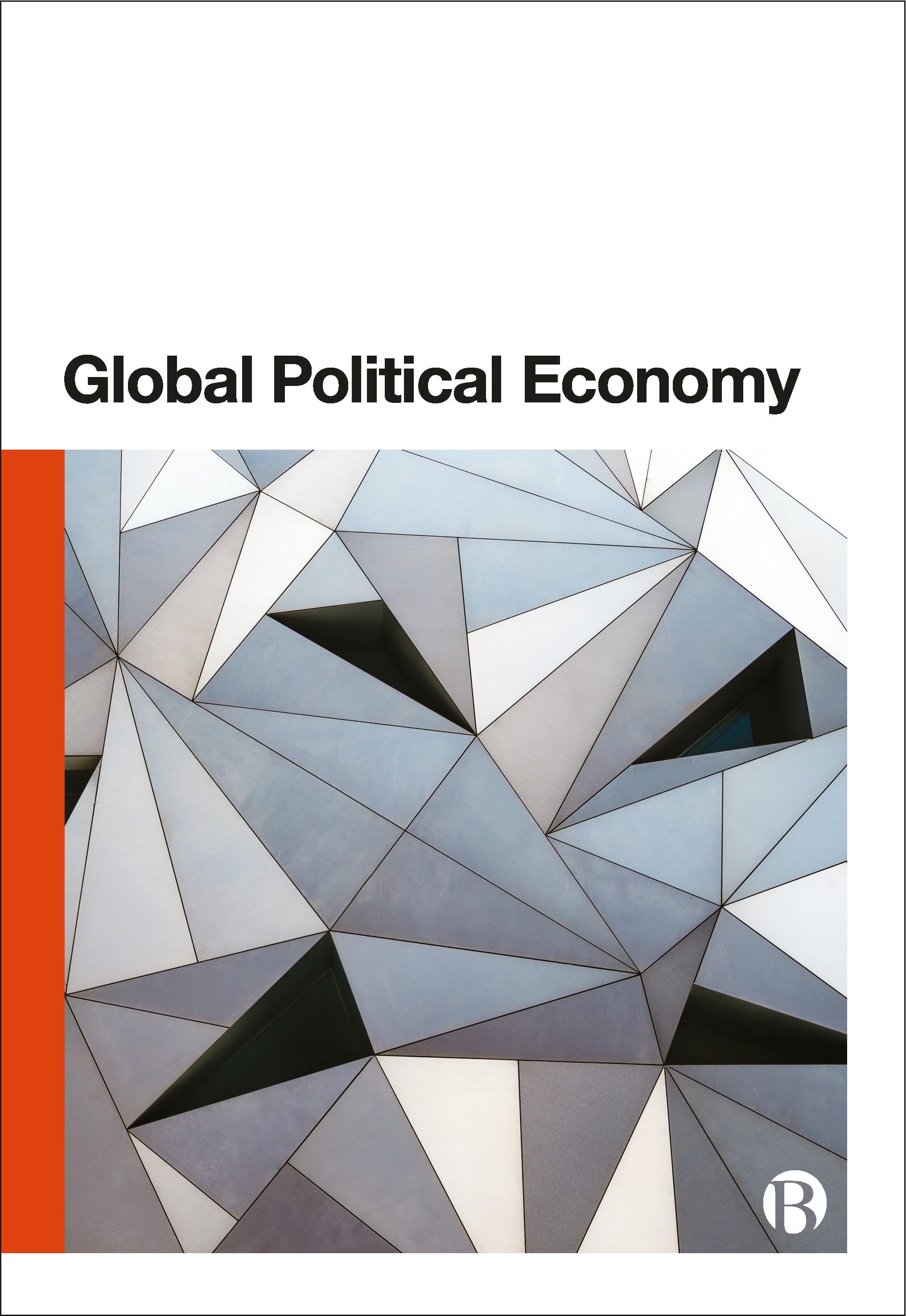 |
Zajontz, Tim 2022. ‘Seamless imaginaries, territorialized realities: the regional politics of corridor governance in Southern Africa’, Territory, Politics, Governance, online first. https://doi.org/10.1080/21622671.2022.2092205.
Corridors are central to contemporary processes of spatial reordering. On the African continent, they feature prominently in development planning at national, regional and continental scales. This article sheds light on the regional politics and supranational governance of cross-border corridors, aspects that have remained underrepresented in the burgeoning literature on corridors. Combining theoretical insights from the New Regionalism Approach and critical political geography and focusing on the ‘corridor agenda’ pursued by the Southern African Development Community (SADC), the article deconstructs dominant conceptions of corridors as archetypal spaces of flow and advances the argument that the spatial production and governance of cross-border corridors are contingent upon the compatibility of scalar and territorial articulations of state space. In the case of the Walvis Bay–Ndola–Lubumbashi Development Corridor, the incompatibility of Namibia’s decidedly regional ‘gateway strategy’ and Zambia’s (sub)national ‘pothole politics’ has yielded a connectivity patchwork. Efforts to institutionalize supranational corridor governance have been obstructed by state territoriality aimed at retaining political control over corridor space at the national scale. While commonly represented as spatial panaceas for attaining neoliberal meta-goals of global connectivity and seamless territorial integration, (trans)regional corridors are politically contested spaces that engender dialectical processes of de- and reterritorialization at various scales.
| 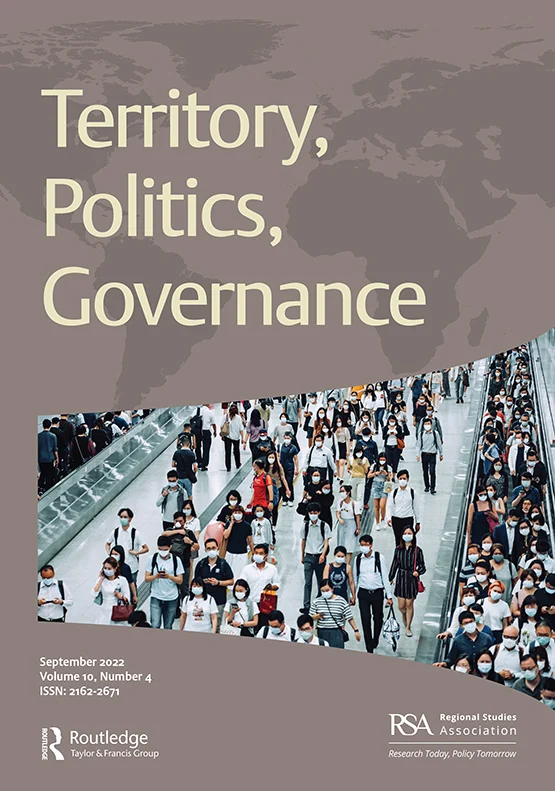 |
Julia Gurol, Tobias Zumbrägel & Thomas Demmelhuber (2022). "Elite Networks and the Transregional Dimension of Authoritarianism: Sino-Emirati Relations in Times of a Global Pandemic", Journal of Contemporary China DOI: https://doi.org/10.1080/10670564.2022.2052444
Scholarly debates on Chinese foreign policy in the Middle East and the international dimension of authoritarianism have gained momentum since Beijing’s Belt and Road Initiative (BRI) in 2013. At the same time, the global pandemic provided a window of opportunity to autocrats worldwide to fine-tune their modes of surveillance for the sake of regime survival. This article deconstructs Sino-Emirati relations in the field of digital surveillance. Inspired by Social Network Theory, we explore three transregional public-private elite networks as multipliers for the traveling of authoritarian practices. We show that authoritarian diffusion under the umbrella of fighting the pandemic is not spatially bound to geograhical proximity or other structural similarities but rather a global phenomenon that state and non-state actors reproduce.
| 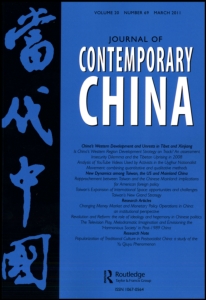 |
Zajontz, Tim (2022). ‘”Win-win” contested: negotiating the privatisation of Africa’s Freedom Railway with the “Chinese of today”‘, Journal of Modern African Studies 60(1): 111-134. 2022, https://doi.org/10.1017/S0022278X21000446
As infrastructure development has become a key ingredient in Africa–China relations, the role of African governments in co-determining the design, funding and governance of the continent's infrastructures has come under close scrutiny. This article sheds light on the rehabilitation of a symbol of Sino–African friendship: the Tanzania–Zambia Railway Authority (TAZARA). Employing Jessop's strategic-relational approach, it is shown that the strategies of the shareholding governments in the negotiations with a Chinese consortium were informed by strategic learning from previous railway privatisations, corresponding cost–benefit analyses and reflection about Chinese commercial interests. Zambia's indebtedness and Tanzania's autocratic developmental state under President Magufuli formed crucial elements of the structural context in which the fate of Africa's Freedom Railway was negotiated. The article transcends both crudely structuralist accounts of a supposedly all-powerful China and voluntarist conceptions of African agency that are void of structure. Assessing (African) agency requires analytical sensitivity towards the dialectical interaction between specific strategic capacities and strategically selective political–economic contexts.
| 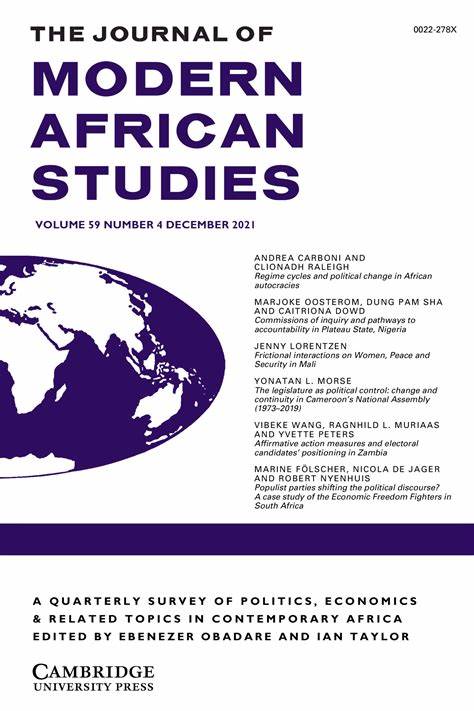 |
Chiyemura, Frangton, Gambino, Elisa and Tim Zajontz (2022). ‘Infrastructure and the politics of African state agency: shaping the Belt and Road Initiative in East Africa’, Chinese Political Science Review, online first, https://doi.org/10.1007/s41111-022-00214-8.
Infrastructure development has experienced a political renaissance in Africa and is again at the centre of national, regional, and continental development agendas. At the same time, China has been identified by African policy-makers as a particularly suitable strategic partner. As infrastructure has become a main pillar of Sino-African cooperation, there has been growing analytical interest in the role of African actors in shaping the terms and conditions and, by extension, the implementation of infrastructure projects with Chinese participation. This follows a more general African “agency turn” in China–Africa studies, which has shifted the research focus onto the myriad ways in which African state and non-state actors shape the continent's engagements with China. This article is situated within this growing body of literature and explores different forms of African state agency in the context of Tanzania's planned Bagamoyo port, Ethiopia's Adama wind farms, and Kenya’s Lamu port. We posit a non-reductionist and social-relational ontology of the (African) state which sees the state as a multifaceted and multi-scalar institutional ensemble. We show that the extent and forms of state agency exerted are inherently interrelated with and, thus, highly contingent upon concrete institutional, economic, political, and bureaucratic contexts in which African state actors are firmly embedded. In doing so, we make the case for a context-sensitive analysis of various spheres of state agency in particular conjunctures of Sino-African engagement.
| 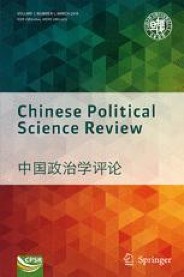 |
Zajontz, Tim (2022). ‘Debt, distress, dispossession: towards a critical political economy of Africa’s financial dependency’, Review of African Political Economy 49(171): 173-183, https://doi.org/10.1080/03056244.2021.1950669
With China's rise to become Africa's largest bilateral creditor, much research has focused on an evidence-based critique of the politicised narrative about China's supposed ‘debt trap diplomacy'. At a more fundamental level, this debate problematises the function of debt and related power differentials in late capitalism and calls into question development paradigms, notably the hegemonic infrastructure-led development regime, that have sustained Africa's financial dependency into the 2020s. As the International Monetary Fund is yet again shuttling between Addis Ababa, Lusaka, and Nairobi to resurrect fiscal discipline and to ensure debtor compliance for the post-pandemic ‘payback period', it is argued that (i) periodic cycles of debt financing, debt distress and structural adjustment are a systemic feature of the malintegration of Africa into the global capitalist economy, and (ii) critical research on the social costs and economic beneficiaries of renewed rounds of austerity and privatisation in Africa’s current debt cycle is needed.
| 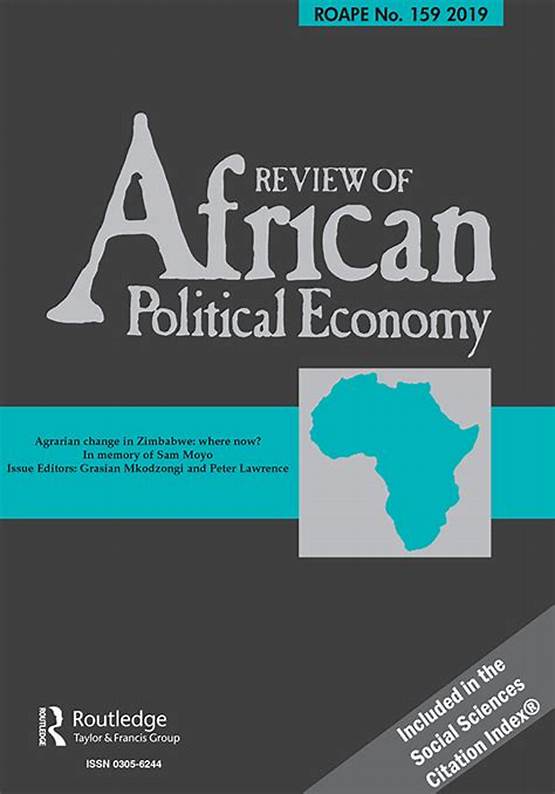 |
Carmody, Pádraig, Taylor, Ian and Zajontz, Tim (2022). ‘China’s Spatial Fix and “Debt Diplomacy” in Africa: Constraining Belt or Road to Economic Transformation?’, Canadian Journal of African Studies 56(1): 57-77, https://doi.org/10.1080/00083968.2020.1868014
Mounting overaccumulation of capital and material has compelled the Chinese government to seek solutions overseas. The Belt and Road Initiative (BRI), with its transregional infrastructure projects connecting Eurasia and Africa, is the hallmark venture in this effort. Chinese road, railway, port and energy projects, implemented under the BRI banner, have become widespread in Africa. This article traces drivers of the BRI in the post-reform evolution of the Chinese economy and conceptualises the BRI as a multi-vector “spatial fix” aimed at addressing chronic overaccumulation. Focusing on Kenya, Djibouti and Ethiopia, the paper documents how loan financing related to BRI projects reveals contradictions that arise from China’s spatial fix in Africa. Concerns about a looming debt crisis on the continent and the questionable economic sustainability of some BRI projects have become more pressing amidst the COVID-19-induced economic contraction. Hopes for Africa’s economic transformation based on increasing connectivity under the BRI are unlikely to materialise.
|  |
Zajontz, Tim (2022). ‘The Chinese infrastructural fix in Africa: Lessons from the Sino-Zambian “road bonanza”’, Oxford Development Studies 50(1): 14-29, https://doi.org/10.1080/13600818.2020.1861230.
This article scrutinises the surge in Chinese-funded road development in Zambia with the help of David Harvey’s theory of spatio-temporal fixes. The ‘moving out’ of Chinese surplus capital and material to Africa has been facilitated by an extensive disbursement of loans and export credits for infrastructure projects. Transcending Harvey’s analytical ‘imperio-centrism’, the article shows that the actualisation of the Chinese infrastructural fix has been contingent upon Zambia’s ambitious, debt-financed infrastructure development agenda. Particularities of Chinese loan financing have thereby fostered ‘not so public’ procurement processes and accelerated Zambia’s rapid debt accumulation. As rising debt has imposed structural constraints, the recent shift in the financial governance of road development towards private project finance is analysed with reference to the Lusaka-Ndola dual carriageway. The renaissance of public-private partnerships and the gradual privatisation of Zambian roads signify new rounds of accumulation by dispossession, as the Chinese infrastructural fix enters its next stage.
|  |
Destradi, Sandra; Plagemann, Johannes & Cadier, David (2021): Populism and foreign policy: a research agenda. Comparative European Politics DOI: https://doi.org/10.1057/s41295-021-00255-4
The worldwide rise of populist governments represents one of the most crucial political developments of recent years. In Europe in particular, a range of populist parties and leaders have been voted into power and have formed (or joined) governments over the past decade—this is true, for instance, in Austria, Estonia, Finland, Greece, Hungary, Italy or Poland. As populist actors leave the opposition to seize the reins of executive power, they have entirely new possibilities to directly shape not only domestic policies, but also their countries’ foreign policy and European politics more generally. This could have important repercussions on the European integration project, on relations among European member states and with external powers such as Russia and China, on EU policies in areas such as migration or support to democratization, and on international norms and organizations more generally.
| 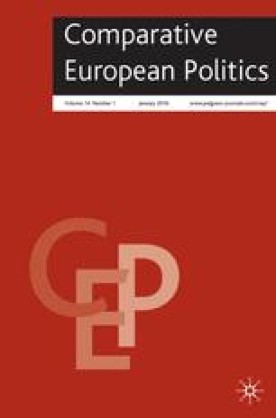 |
Destradi, Sandra; Plagemann, Johannes & Tas, Hakki (2022): Populism and the politicisation of foreign policy. The British Journal of Politics and International Relations DOI: https://doi.org/10.1177/13691481221075944
Populists in power often resort to the politicisation of foreign policy to generate domestic support. This article explores this process. First, it conceptualises populist politicisation of foreign policy. Second, it develops expectations on how such politicisation will take place: the distinctive features of populism (the intensity of populist discourse, the relative weight of anti-elitism and people-centrism, and a transnational understanding of the ‘people’ or the ‘elite’) will have an impact on how foreign policy is politicised. The empirical analysis focuses on selected public speeches and tweets by two populist leaders from the Global South: Recep Tayyip Erdoğan and Narendra Modi. The analysis reveals huge differences: the more populist Erdoğan emphasises anti-elitism and extensively resorts to the politicisation of Turkish foreign policy by constructing foreign threats. Modi is less populist and his discourse emphasises people-centrism; as expected, he only marginally politicises foreign policy, highlighting the greatness of the Indian nation.
| 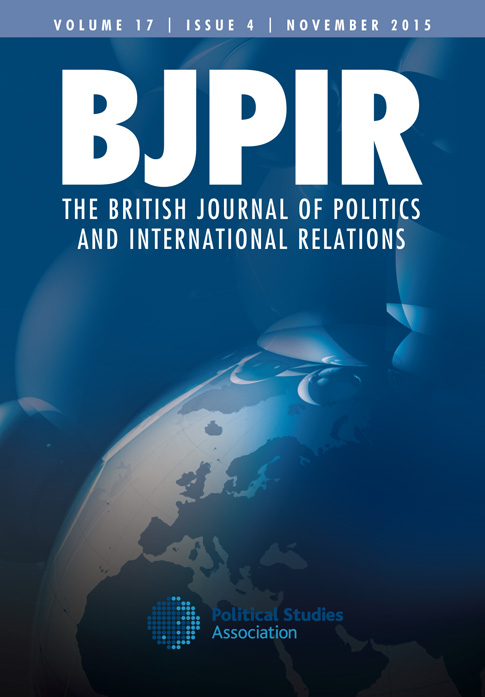 |
Rüland, Jürgen (2021): Covid-19 and ASEAN: Strengthening State-centrism, Eroding Inclusiveness, Testing Cohesion, The International Spectator, DOI: 10.1080/03932729.2021.1893058
The Association of Southeast Asian Nations (ASEAN) has responded to the Covid-19 crisis in a path-dependent way. The latter is shaped by a time-tested repository of cooperation norms, which give precedence to national sovereignty. Hence, belated, ad hoc and largely declaratory collective responses to the Covid-19 crisis are business as usual and are unlikely to have disruptive effects on ASEAN’s operations. Yet member countries’ emergency measures are intensifying ongoing processes of democratic backsliding and will have negative repercussions on the grouping’s inclusiveness. They will impair advancements towards a people-oriented ASEAN. Regional cohesion will be further jeopardised by relations with China, which have intensified due to Chinese “mask diplomacy”, but are also increasingly influenced by China’s encroachments on ASEAN member states’ claims in the contested South China Sea.
| 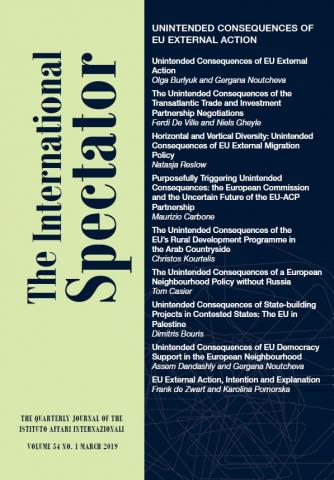 |
Weber, Anne-Katrin (2020): Corporate Role Conceptions in Global Forest Governance, Global Policy 11 (5), 611-627 DOI: https://doi.org/10.1111/1758-5899.12874
Multinational corporations (MNCs) are increasingly seen as key actors in global governance. This article introduces the concept of corporate role conceptions as a new and interdisciplinary approach for analysing the self-conception of MNCs. To illustrate its analytical strength, the concept is used to explore how MNCs operating in major forest-risk supply chains, that is, cattle, palm oil, pulp, soy and timber, conceive themselves and their function in global forest governance. The empirical analysis shows that their self-conception is both complex and multifaceted as they seek to perform several functions at the same time: corporate decision-makers consider it appropriate for their corporation to be a pioneer, a role model, a supporter and co-creator, a dedicated worker, a force for prosperity, a good global citizen and a good steward. However, these corporate role conceptions are overlapping and partly incompatible, which leads to role conflict. I argue that this role conflict constrains corporate agency in global forest governance and therefore diminishes the potential of MNCs to promote positive change. | 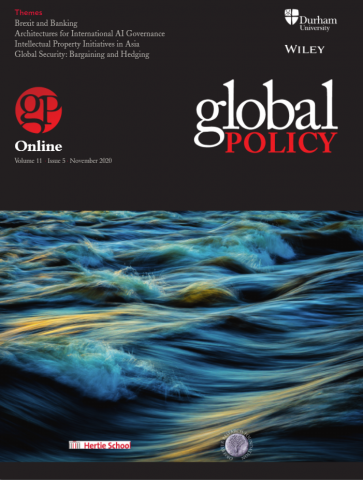 |
Shrma, Chanchal, Destradi, Sandra & Plagemann, Johannes (2020): Partisan Federalism and Subnational Governments’ International Engagements: Insights from India. Publius: The Journal of Federalism, Volume 50 https://doi.org/10.1093/publius/pjaa017
This article situates the international activities of subnational governments in India within the broader political economy of federalism. It argues that the nature and the extent of subnational states’ engagements in international affairs are a function of the partisan political relationship the state incumbents have with the national incumbents. The article takes a mixed methods approach. An analysis of 1,153 episodes of international engagements of India’s states from 1996 to 2017 reveals that shifts in foreign policy engagement of selected state governments primarily reflect alterations in the subnational incumbents’ political affiliation with the Union government. Several qualitative case studies shed light on how the central government’s inclusion of subnational governments’ perspectives and representatives in foreign affairs is highly partisan and profoundly political. Therefore, the Indian case reveals how subnational diplomatic interactions merge domestic and international politics. | |
Jenss, Alke & Schuetze, Benjamin (2020). Rethinking Authoritarian Power: The Logistics Space and Authoritarian Practices in and between Secondary Port Cities of the Global South. International Studies Quarterly. Open access. Online first.
How to rethink authoritarian power in ways that better account for authoritarian connections beyond nation-state boundaries? By reconceptualizing the context in which to analyze authoritarian power, we bring to light transregional authoritarian connections between the secondary port cities Aqaba/Jordan and Buenaventura/Colombia. We demonstrate that processes of privatization and a continuum of pre-emptive, technocratizing, and repressive authoritarian practices with the overall purpose of enabling capital accumulation occur in a remarkably entangled manner in both locales, even if located at seemingly unconnected geographical sites. By thinking of Aqaba and Buenaventura as occupying the same “transregional authoritarian logistics space” (TALS), we understand Buenaventura through Aqaba, and vice versa. This crisscrossing of established notions of context has important implications for our understanding of authoritarianism and future transregional research designs. As a unit of analysis, the TALS allows us to highlight the role of global logistics players and “developmental aid” agencies—actors rarely discussed in literature on authoritarianism—in rearticulating boundaries within and beyond the nation-state based on class and race. Our contribution calls for an understanding of authoritarian power as transregionally entangled, rather than separate and limited to the nation-state and builds on literatures on authoritarian practices, authoritarian neoliberalism, critical logistics, and transregional connections. | 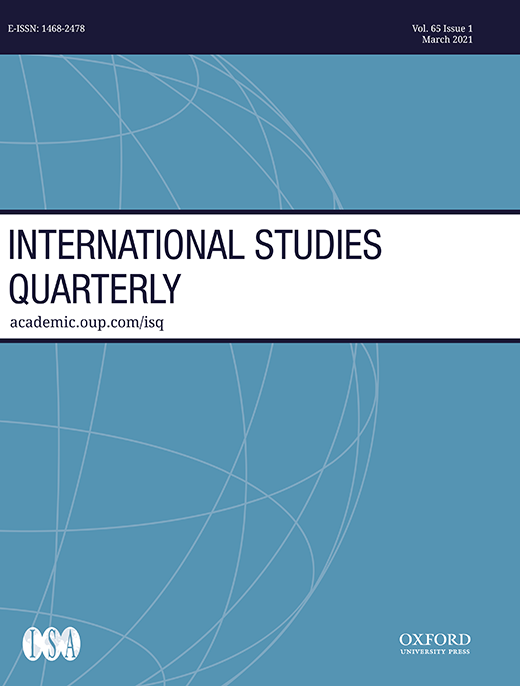 |
Müller, Lukas Maximilian (2020). Challenges to ASEAN centrality and hedging in connectivity governance—regional and national pressure points. The Pacific Review. Online first: https://doi.org/10.1080/09512748.2020.1757741
Since 2010, ASEAN has made efforts to increase its coherence and visibility as an actor in regional infrastructure development, under the umbrella term of connectivity. Its most recent strategy, 2016’s Master Plan on ASEAN Connectivity 2025, is notable for its more focused agenda as well as a tableau of institutional innovations, including new policy coordination mechanisms and a project preparation pipeline. Nonetheless, ASEAN struggles to maintain coherence in the implementation of its connectivity agenda, both internally as well as towards its dialogue partners. Utilizing the concepts of centrality and hedging as parts of a unified theoretical framework, this paper analyzes ASEAN’s efforts to mobilize and manage external resources in connectivity. ASEAN’s resource dependence and its failure to establish institutional centrality creates issues at the regional and the national levels. Regionally, ASEAN’s lack of centrality and its perpetuation of ASEAN+1 relations have contributed to the emergence of contesting agendas and institutional frameworks by external actors. Nationally, the hedging strategies of ASEAN member states are at odds with the regional vision, highlighting a lack of intra-ASEAN coherence. The perpetuation of contesting institutional frameworks by external actors at the national level solidifies existing incoherence in ASEAN’s connectivity governance, further undermining its centrality. ASEAN’s efforts to assert centrality and execute a hedging strategy in connectivity are emblematic of its attempts to extend its reach into new policy areas, but also of its persistent governance constraints. |
|
Rüland, Jürgen (2020). Democratic backsliding, regional governance and foreign policymaking in Southeast Asia: ASEAN, Indonesia and the Philippines. Democratization. Online first: https://doi.org/10.1080/13510347.2020.1803284
This article examines democratic backsliding in the spheres of regional cooperation and foreign policymaking in Southeast Asia. It argues that backsliding is limited because the space for the Association of Southeast Asian Nations (ASEAN) and its member states to promote democracy has always been strongly curtailed by ideational path dependencies. These include an autocratic type of regional corporatism and the ASEAN Way as the region’s established repository of cooperation norms. While ASEAN has thus largely failed to become more inclusive, democracy promotion policies of the grouping’s democratically most advanced member states, Indonesia and the Philippines, are more ambiguous. Despite eroding democratic practices at home, democracy is still a pillar of Indonesia’s foreign policy. By contrast, in the Philippines, the incumbent Duterte presidency increasingly securitizes foreign policy, relegating democracy to a backseat. | 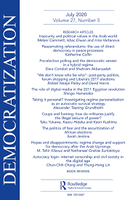 |
Rüland, Jürgen (2019): Old Wine in New Bottles? How Competitive Connectivity Revitalises an Obsolete Development Agenda in Asia. In: Journal of Contemporary Asia, 1-13.In Asia “connectivity” is celebrated as a panacea to kick-start rapid economic growth in the region’s less developed countries. In the process, China and Japan, but also India, Thailand and South Korea, have become major donors and investors in physical infrastructure. While infrastructure is an important facilitator of economic growth, it must be sustainable. This commentary argues that this is not the case in the current infrastructure drive. Many large-scale projects have unacceptably high social costs. This is due to the fact that in the implementation of connectivity schemes, Asian donors are guided by their experiences during their own phase of rapid development. These experiences are strongly influenced by the developmental state and authoritarian variants of modernisation theory. These are outdated concepts with the inherent danger of initiating a downward spiral in project quality, notwithstanding reassurances of the donors to be committed to quality infrastructure.
| 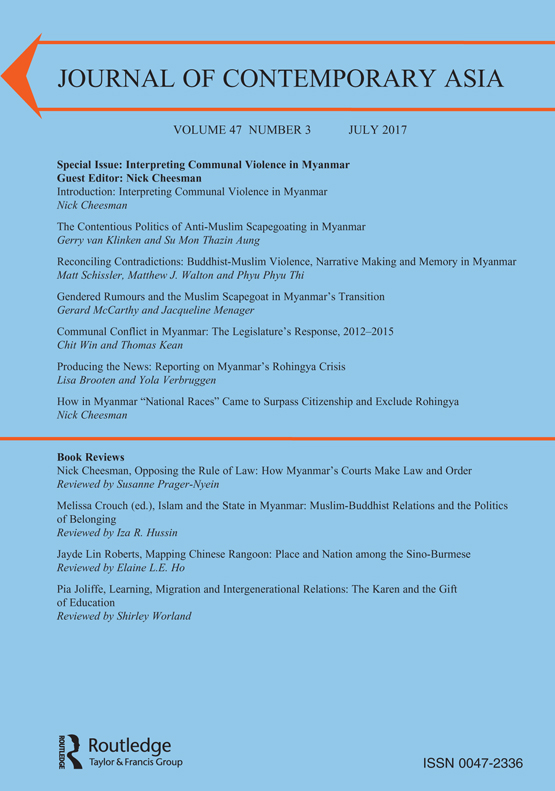 |
Manea, Maria-Gabriela & Rüland, Jürgen (2019): The diffusion of parliamentary oversight: investigating the democratization of the armed forces in Indonesia and Nigeria. In: Contemporary Politics, 1-21.Parliamentary control of the armed forces is a core norm of the liberal security sector reform paradigm. Western governments and transnational actors have spread this norm to democratizing states through financial and technical assistance. This article examines its diffusion to two new democracies of the Global South, Indonesia and Nigeria. Past research on civil-military relations has relied on historical and rationalist explanations of the ideational and institutional change. Employing diffusion theory, this article adopts an alternative approach. The findings display major differences while Nigerian reformers contented themselves with a mere mimicry of the externally propagated norm, the Indonesian contestation over parliamentary oversight has produces ‘constitutive localization’.
| 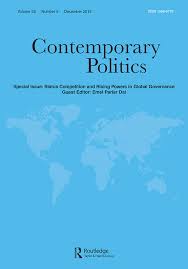 |
Müller, Lukas Maximilian (2019): ASEAN centrality under threat - the cases of RCEP and connectivity. In: Journal of Contemporary East Asia Studies, 1-22 .This contribution takes stock of ASEAN centrality in trade and the emerging policy area of trade infrastructure, also known as connectivity. ASEAN centrality in the East Asian and Indo-Pacific regions has increasingly been called into question, but most studies have failed to specify what ASEAN centrality is and how it can be measured. Outlining both a technical and a substantial definition, this study presents the state of affairs and current trends of ASEAN centrality in the areas of trade and connectivity. Disaggregating the concept, the paper assesses ASEAN’s role in the two policy areas as a leader, convener, convenience, and necessity. ASEAN’s central position in trade is under threat due to a changing environment, with trade ties increasing between ASEAN’s partners. In addition, ASEAN leadership in the RCEP negotiations has been symbolic rather than substantial. In connectivity, ASEAN centrality is even more questionable. Its regional connectivity vision is contested by other states and relationships act as conduits for the exercise of power. | 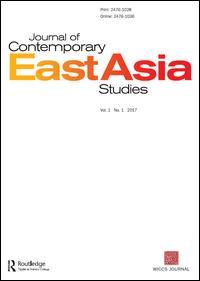 |
Rüland, Jürgen (2019): From Trade to Investment. ASEAN and AFTA in Era of the "New Regionalism". In: Pacific Affairs, Vol. 92 (3): 533-540.The article is part of the Pacific Affairs feature entitled “Enduring Issues, Changing Perspectives.” The feature revisits what can be claimed to be a “classic” article previously published in the journal, that has attracted significant attention. This article revisits Paul Bowles “ASEAN, AFTA and the ‘New Regionalism,’” published by Pacific Affairs in 1997. It reflects upon the article’s significance at the time it was published and how scholarship on the topic has developed and changed since then. | 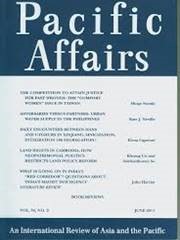 |
Rüland, Jürgen (2019): Good global citizen? ASEAN's image building in the United Nations. In: Asia Pacific Business Review, Vol. 25 (5): 751-771 .Based on role theory, the article examines the images that ASEAN member governments project of their organization. It rests on a discourse analysis of 198 speeches in the United Nations General Assembly between 1998 and 2017. Findings suggest that ASEAN does not figure as a top priority for delegates and that an overarching ASEAN role conception is missing. However, their addresses reveal parameters on which a collective role conception can be built. Individual ASEAN countries undertake great efforts to project themselves as ‘good global citizens,’ a role conception that could also be applied to ASEAN. | 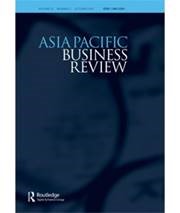 |
Fünfgeld, Anna (2019): The Dream of ASEAN Connectivity: Imagining Infrastructure in Southeast Asia. In: Pacific Affairs, Vol 92 (2): 287-311.Large-scale infrastructural development schemes are currently experiencinga worldwide political revival. Beyond establishing physical connections over distance, enhancing trade relations, and enabling service delivery, such schemes also play a central role in the construction of political entities. For the Association of Southeast Asian Nations (ASEAN), infrastructure development is crucial for the advancement of regional connectivity. Its Master Plan on ASEAN Connectivity (MPAC) includes large-scale projects such as the trans-ASEAN highway, trans-regional power grids, and a regional gas pipeline network. Linking Henri Lefebvre’s conceptualization on the production of space with recent literature on the role of infrastructure imaginaries, this paper explores how the region’s future is envisioned in the Southeast Asian dream of connectivity. The study primarily relies on a hermeneutic analysis of video releases that promote the Master Plan. It shows that—similar to other infrastructure projects—the connectivity dream is closely related to imaginaries of movement and modernity. However, as it is almost exclusively an urban vision, the connectivity agenda seems not only to interconnect and homogenize regional space but it may also enforce preexisting disconnections and so potentially lead to more fragmentation. | 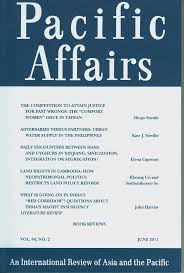 |
Rüland, Jürgen & Michael, Arndt (2019): Overlapping regionalism and cooperative hegemony: how China and India compete in South and Southeast. In: Cambridge Review of International Affairs, Vol 32 (2): 178-200.This article examines the phenomenon of overlapping regionalism in South and Southeast Asia. Theoretically it rests on Thomas Pedersen's ideational-institutionalist realism' approach. We argue that in the two sub-regions under study the proliferation of regional organizations has been greatly stimulated by hegemonic and counter-hegemonic dynamics involving Asia's largest powers, China and India. We claim that sceptical world views highlighting vulnerability, victimization and national survival are deeply entrenched in the mental maps of the region's foreign policy elites. Regional institution building is thus informed by the tenets of realism. We trace how and why China and India seek to establish 'cooperative hegemonies' by building regional institutions for incorporating their neighbours into their sphere of influence while keeping rival powers at bay, and also show why smaller states in the region join these regional fora. | |
Crawford, Gordon & Simonida Kacarska (2019): Aid sanctions and political conditionality: continuity and change. In: Journal of International Relations and Development, Vol 22 (1): 184-214. [Online First: 08 June 2017]. | |
Weber, Anne-Kathrin (2018):The Revival of the Honourable Merchant?Analysing private forest governance at firm level. In: International Environmental Agreements, Vol. 18 (4): 619-634 .In the context of global climate governance, multinational corporations (MNCs) are increasingly seen as financial, technical and political partners. Looking at MNCs with core business activities linked to deforestation, this article analyses private governance activities focused on sustainability that occur at firm level. These activities include newly enacted, concrete policies and activities aimed at climate protection, such as the concept of carbon insetting. The current body of the literature on global governance focuses largely on collective action, with activities at firm level still under-researched and under-conceptualized. To better understand (a) what drives MNCs to undertake such activities and (b) why their performance differs both within and between industry sectors, three motives are proposed—preventing reputational damage, building resilience and assuming ethical responsibility—with the latter indicating a revival of the Honourable Merchant, an economic role model created in the early 16th century. The empirical analysis is, therefore, embedded in a theoretical framework that seeks to capture the complexity of corporate rationality. | |
Panke, Diana & Gurol, Julia (2018): Small States as Agenda Setters? The Council Presidencies of Malta and Estonia. In: Journal of Common Market Studies, Vol. 56 (1): 142-151.The Council Presidency is an important office rotating biannually amongst EU members. In 2017, two small states, Malta and Estonia, held this position. Being the Council Presidency resembles a window of opportunity for small states to pursue core interests in setting the EU’s political agenda and leaving national imprints on EU policy. This article examines similarities and differences of how these states approached their respective Council Presidencies. Although Malta is smaller, it was less selective and pursued a broader array of priorities than Estonia. Consequently, the latter succeeded in being recognized as leading country in digitalization and managed to trigger corresponding policy innovation in the EU. Malta also influenced the EU’s agenda but focused less on one particular policy field as a consequence of which, its impact stands less out. This suggests that smaller states are better off in concentrating their efforts on a limited number of priorities.
| 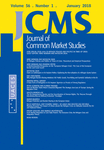 |
Piper, Nicola & Rother, Stefan & Rüland, Jürgen (2018): Challenging State Sovereignty in the Age of Migration. Concluding Remarks. In: European Journal of East Asian Studies, Vol. 17 (1): 118-133.The multi-level dimension of migration governance is gaining increasing attention – and that includes the regional and sub-regional level. As a contribution to this research, Nicola Piper, Jürge.n Rüland and Stefan Rother have guest edited a two-part special Issue for the European Journal of East Asian studies (EJEAS). The theme is “Challenging State Sovereignty: A Multi-level Approach to Southeast and East Asian Migration” and the topics of the articles range from “Mobility Norms in Free Trade Agreements” to the migration industry, securitization of migrant, refugee protection, migrant domestic workers as agents of development and pilgrimage migration to Mecca. The seven empirical studies in this Special Issue thus examine current political, economic, social and legal dimensions of migration in Southeast Asia from an interdisciplinary perspective, linking the discussion of the migration–sovereignty nexus to ‘regional migration regimes’, ‘the transnational–national intersection’ and ‘grass-roots responses’. The common message that emerges from the papers in this issue — that state sovereignty in the area of migration is being challenged from multiple levels — leads us to argue for a future research agenda which would align the study of sovereignty more closely with governance studies as well as studies on norm diffusion. Such an agenda would contribute new insights into emerging forms of sovereignty beyond the confines of the state. | |
Mehler, Andreas & Glawion, Tim & de Vries, Lotje (2018): Handle with Care! A Qualitative Comparison of the Fragile States Index's Bottom Three Countries: Central African Republic, Somalia and South Sudan. In: Development and Change.For the past four years, the Fund for Peace has ranked the Central African Republic, Somalia and South Sudan as the ‘most fragile states’ in the world, in its annual Fragile States Index (FSI). The three countries’ almost identical scores suggest comparability; however, critics raise concerns about the FSI's data aggregation methods, and its conflation of causes and consequences. This article treads the uncharted path of unpacking the empirical realities that hide behind FSI indicators. Drawing on data collected during field research in the three states, the authors investigate three security indicators (security apparatus, factionalized elites, and external intervention) and propose an alternative, qualitative appreciation. Each country's fragility is based on how security forces, elites and interventions evolved over time and installed themselves differently in each region of the country. The qualitative assessment presented here shows that not every indicator matters in all cases at all times or throughout the country. Most crucially, the authors unveil enormous differences between and within the FSI's three ‘most fragile states’. Such variations call for better‐adapted and more flexible intervention strategies, and for quantitative comparisons to be qualitatively grounded. | |
Rother, Stefan (2018): Angry birds of passage - migrant rights networks and counter-hegemonic resistance to global migration discourses. In: Globalizations, Vol. 15 (6): 854-869.The past decade has seen the emergence of a global migration governance architecture. But while – unlike other ‘objects’ of global governance – migrants are able to speak for themselves, only limited participatory space has been reserved for them in global processes. In reaction to this glaring democratic deficit, migrant organizations try to challenge and bring about change in the nascent global migration regime. Drawing from neo-Gramscian approaches, this paper analyses the various political spaces where a cluster of migrant rights organizations and ‘networks of networks’ express and organize resistance and counter-hegemonic discourses to the current paradigms within global migration governance. Particularly, this article focuses on two spaces of organizing: the International Assembly of Migrants and Refugees (IAMR), held by the International Migrants Alliance (IMA), and the Churches Witnessing With Migrants (CWWM) wherein temporary labour migrants, often referred to as ‘birds of passage’, form a large part of their constituency.
| 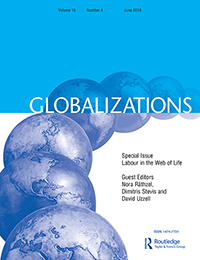 |
Panke, Diana, Stapel, Sören (2018) Exploring Overlapping Regionalism. In: Journal of International Relations and Development, Vol. 21 (3): 635-662.Overlapping regionalism results from the fact that states are members in multiple regional organization (RO) at the same time. This explorative paper provides the first comprehensive mapping of overlapping regionalism today and illustrates that it is not confined to Africa or Asia, but also prevalent in the Americas and Europe. Furthermore, all 62 ROs currently in place have overlaps to one another, but some are more interdependent than others. The paper examines why states are in more than one RO at a time and why the extent of overlaps varies between ROs. Since overlapping regionalism can have negative implications for the effectiveness of individual regional integration projects, due to the possibility or rule and action-conflicts, this paper not only maps the conflict potential, but also examines why overlapping regionalism varies. The paper shows that overlapping regionalism is driven by both, opportunities and incentives. While there are global pattern, such as the finding that RO dyads have greater overlaps, the stronger their institutional similarities and the longer they have coexisted, some regional particularities exist as well. | |
Panke, Diana, Stapel, Sören (2018): Overlapping Regionalism in Europe - Patterns and Effects. In: British Journal of Politics and International Relations, Vol. 20 (1): 239-258.European states have not only joined several regional organizations (ROs) over time, but ROs’ policy competencies have also broadened in scope. As a result, states are exposed to overlapping regionalism, defined as the extent to which ROs share member states and policy competencies at the same time. First, this article identifies patterns of overlapping regionalism in Europe. In second step, it sheds light on consequences from overlapping regionalism for RO effectiveness, more particularly non-compliance. We argue that an increase in the extent to which a member state is exposed to overlapping regionalism increases its probability for violations of RO norms and rules, which reduces RO effectiveness. When states have joined more ROs with similar policy competencies, the number of rules and norms that need to be complied with is higher. Non-compliance also becomes more likely when these rules and norms are not identical or even incompatible. | |
Rüland, Jürgen (2018): Coping with crisis: Southeast Asian regionalism and the ideational constraints of reform. In: Asia Europe Journal, Vol. 16 (2): 155-168.The key argument of this article is that during serious crises and external shocks, societal actors do not necessarily follow the predictions of theories on ideational change. This literature argues that crises and external shocks spur ideational change as expectations associated with the old order are no longer met. A study of the Association of Southeast Asian Nations (ASEAN) shows that the Asian financial crisis of 1997/1998 stimulated a reform debate but that this discourse did not facilitate paradigmatic changes in the region’s repository of cooperation norms. What at first sight appeared to be an accelerating Europeanization of Southeast Asian regionalism proved to be a process involving the retention of major elements of the region’s “cognitive prior.” New ideas of regional integration have at best been emulated or localized, but have not led to a thorough transformation of Southeast Asian cooperation norms. This must be attributed to the entrenched nature of the region’s cognitive prior epitomized by the worldviews of political decision-makers who regard the external world as essentially hostile. This belief has been reproduced many times in the political experiences of the region’s foreign policy elites—not least by the Asian Financial Crisis—thus confirming the ideational orthodoxy that national sovereignty provides the best protection for nation states. A deepening of regional integration is faced with major ideational obstacles under these conditions. | 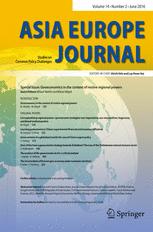 |
Schütze, Benjamin (2018): Marketing parliament: The constitutive effects of external attempts at parliamentary strengthening in Jordan. In: Cooperation and Conflict, online first, April 23.The Jordanian parliament is widely recognised as a patronage provider and means for authoritarian upgrading. Despite, or precisely because of this, it has over the past years become a linchpin of US and European attempts at parliamentary strengthening. The parliament’s highly marginalised position notwithstanding, this article suggests that such efforts provide us with an insightful opportunity to better understand the reconfiguration of authoritarian power via external intervention in the name of democracy. Discussing the contradictory effects of parliamentary strengthening programmes in Jordan, the article tries to shift the discussion of democracy promotion away from a concern with policy, conceptual debates and intentions to one with democracy promotion’s constitutive effects. As such, the article investigates the framing of Jordanian politics within a market rationale as central mechanism for the de-politicisation of uneven power relations. Further, it explores the ways in which democracy promotion serves to seemingly reconfirm interveners’ desired self-understandings via the maintenance of assumptions of cultural ‘difference’. Ultimately, it is suggested that decentring the study of democracy promotion by paying more attention to its constitutive effects provides us with a better understanding of why and how increasing democracy promotion portfolios have, in Jordan, had the effect of strengthening authoritarianism. | |
Michael, Arndt (2018): Realist‐Constructivism and the India–Pakistan Conflict: A New Theoretical Approach for an Old Rivalry. In: Asian Politics & Policy, Vol. 10 (1): 100-114.The India–Pakistan conflict, one of the oldest unresolved interstate conflicts in the world, began in 1947 and has shown no signs of abating. Both realist and constructivist interpretations have offered several differing explanations as to the roots and persistence of this conflict. The article argues that a realist‐constructivist approach as suggested by Samuel Barkin provides a new and better angle for explaining the genesis, evolution, and persistence of the India–Pakistan conflict, in addition to allowing prediction of future developments. Importantly, realist‐constructivism combines several different analytical dimensions: It looks at the way in which power structures affect patterns of normative change in international relations and, conversely, the way in which a particular set of norms affects power structures. Both these dimensions have been overlooked as variables that can explain why it will be difficult to come up with lasting solutions for the India–Pakistan conflict. |  |
Panke, Diana & Petersohn, Ulrich (2017): President Donald J. Trump - an agent of norm death? In: International Journal, Vol. 72 (4): 571-578.Since his inauguration, US President Donald Trump has made news by violating international and domestic norms, such as norms of diplomatic communication or the non-discrimination norm. This paper uses theoretical approaches to norm eradication in order to examine whether President Trump has turned into an effective agent of norm death leading to the abolition of domestic and international standards of appropriateness. It discusses how the precision of the respective norms, the stability of their contexts, and the actions of norm proponents have played out. This reveals that President Trump’s actions have so far lacked effectiveness, and have not led to norm death. The longevity of challenged norms cannot be taken for granted, however—especially if the challenger is a powerful actor. In order to avoid norm death under this circumstance, it is essential that norm proponents possess capacities and competencies to act, and employ them to defend challenged norms.
| |
Panke, Diana (2017): Regional Actors in International Security Negotiations. In: European Journal for Security Research, Vol. 2 (1): 5-21.Since the end of WWII, states have formed several international organizations dealing with international peace and security issues. Among them are the Security Council, the Conference on Disarmament, the Arms Trade Treaty regime, and the First Committee of the United Nations General Assembly. Although regional actors, such as Economic Community of West African States, European Union or the Arab League, are at best observers in those international security organizations (ISO), their member states frequently get active on their behalf. This paper examines how regional actors engage in ISO negotiations. It shows that not all regional actors are equally vocal in the negotiations, which is puzzling given that negotiation activity is important for negotiation success. To explain the variance in regional actor vocality, this paper draws on international conflict and cooperation theories and develops hypotheses on activity of regional actors in international negotiations, which are tested with quantitative methods. It is striking that even in the traditionally state-dominated policy field ‘security’, regional actors are vocal and are, thus, contributing to the creation of international peace architectures. However, the role of regional actors varies, depending on the characteristics of the negotiation arena and of the regional actors themselves.
| |
Panke, Diana & Lang, Stefan & Wiedemann, Anke (2017): State & Regional Actors in Complex Governance Systems. Exploring Dynamics of International Negotiations. In: The British Journal of Politics and International Relations, Vol. 19 (1): 91-112.Over the last decades, the number of international organizations (IOs) and regional groups (RGs) increased tremendously, and states are now simultaneously members of several RGs and IOs. This article inquiries how states act in settings of complexly nested and overlapping institutions on the regional and international levels. How frequently do states voice regional positions in international negotiations and why are some more active in this respect than others? Why are some RGs more vocal than others? Multiple state memberships in RGs foster the regionalization of international negotiation dynamics via burden-sharing mechanisms. In addition, state capacity and power, the age and policy scope of RGs and the institutional design of IOs also shape negotiation dynamics. This article concludes with reflections on implications of regionalized international negotiations for the efficiency and legitimacy of governance beyond the nation-state. | |
Crawford, Gordon & Gabriel Botchwey (2017): Conflict, collusion and corruption in small-scale gold mining: Chinese miners and the state in Ghana. In: Commonwealth & Comparative Politics, Vol. 55 (4): 444-470.As gold prices soared from 2008 onwards, tens of thousands of foreign miners, especially from China, entered the small-scale mining sector in Ghana, despite it being ‘reserved for Ghanaian citizens’ by law. A free-for-all ensued in which Ghanaian and Chinese miners engaged in both contestation and collaboration over access to gold, a situation described as ‘out of control’ and a ‘culture of impunity’. Where was the state? This paper addresses the question of how and why pervasive and illicit foreign involvement occurred without earlier state intervention. Findings indicate that the state was not absent. Foreign miners operated with impunity precisely because they were protected by those in authority, that is, public officials, politicians and chiefs, in return for private payments. Explaining why state institutions failed in their responsibilities leads to reflection about the contemporary state in Ghana. It is concluded that the informality and corruption characteristic of neopatrimonialism remains predominant over legal–rational structures, albeit in a form that has adapted to neoliberal restructuring. Public office remains a means of private enrichment rather than public service. Such findings cast a shadow over the state and government in Ghana, and tarnish its celebration as a model of democratic governance for Africa.
| |
Crawford, Gordon & Aijan Sharshenova (2017): Undermining Western democracy promotion in Central Asia: China’s countervailing influences, powers and impact. In: Central Asian Survey, Vol. 36 (4): 453-472.This article examines whether and to what extent China’s involvement in Central Asian countries undermines the democracy promotion efforts of the European Union and the United States. Findings confirm that China does indeed challenge Western efforts, but in an indirect way. First, Chinese provision of substantial and unconditional financial assistance makes Western politically conditioned aid appear both ungenerous and an infringement of sovereignty. Second, the Shanghai Co-operation Organisation, inclusive of China’s leadership role, creates an institutional means through which the (semi-)authoritarianism of member states is legitimized and challenges Western emphasis on democracy and human rights. Finally, by the power of its own example, China demonstrates that democracy is not a prerequisite for prosperity, the rule of law and social well-being.
| |
Brazys, Samuel & Kaarbo, Juliet & Panke, Diana (2017): Foreign Policy Change and International Norms: A Conceptual Framework. In: International Politics, Vol. 54 (6): 659-668.Foreign policy change (FPC) is an important topic and has therefore attracted much scholarly attention. Yet, the literature has largely overlooked how FPC is related to international norms. This special issue seeks to add value to the field of foreign policy analysis by strengthening the empirical literature linking FPC and international norms. The papers in this issue tease out the intervening factors in facilitating the relationship between foreign policy change and the international norm. The introductory article introduces the conceptual framework which draws on both the structure–agency and “push–pull” debates to provide the cohesive analytical structure for the issue.
| |
Brazys, Samuel & Panke, Diana (2017): Why do states change positions in the United Nations General Assembly? In: International Political Science Review, Vol. 38 (1): 70-84.Many international organizations deal with repeated items on their agendas. The United Nations General Assembly (UNGA) is no exception as many of its resolutions reoccur over time. A novel dataset on UNGA voting on repeated resolutions reveals considerable, but variable, amounts of change on resolutions by states over time. To shed light on underlying causes for voting (in)consistency, this paper draws on IR literature on negotiations and foreign policy changes to develop hypotheses on the role of domestic and international constraints. Our findings suggest that states with limited financial capacity cannot develop their own, principled, voting positions on all norms on the negotiation agenda. Consequently, these states can be more flexible in adjusting their voting position for reoccurring IO norms and are more prone to change their positions over time. Moreover, states with constrained decision-makers change position less frequently due to pluralistic gridlock. Finally, while large and rich states make a small number of purposive vote shifts, poor and aid-recipient states engage in ‘serial shifting’ on the same resolutions, a finding suggestive of vote-buying. The prevalence of position changes suggests that the international norm environment may be more fragile and susceptible to a revisionist agenda than is commonly assumed.
| |
Panke, Diana (2017): Studying Small States in International Security Affairs. A Quantitative Analysis. In: Cambridge Review of International Affairs, Vol. 30 (2-3): 235-255.Todays’ international security architecture composed of international security treaties and international security norms has been established and formalized by negotiations. Owing to the great importance of international security negotiations for international security practices, this paper sheds light on negotiation activities. A study of 100 different international security negotiations shows that states vary considerably with respect to their negotiation activity. Some countries voice positions very often, while others remain completely silent. This is puzzling, as active negotiation participation is an expression of state sovereignty and a means to influence the shape of the international security architecture. The article distinguishes between capacity and incentives as driving forces of state activity in international security negotiations. The analysis reveals that, next to political and financial capacities, states that place high priority on military matters are more active, while smaller and poorer states are more likely to shelter under the security umbrella of larger counterparts.
| |
Schütze, Benjamin (2017): Simulating, marketing, and playing war: US–Jordanian military collaboration and the politics of commercial security. In: Security Dialogue, Vol. 48 (5): 431-450.The King Abdullah II Special Operations Training Center (KASOTC) was financed and established by the US Department of Defense, is operated by a US private business, and is owned by the Jordanian army. It not only offers a base for the training of international Special Forces and Jordanian border guards, but also for military adventure holidays, corporate leadership programs, and stunt training for actors. This article provides an analysis of the processes and technologies involved in US–Jordanian military collaboration by investigating some of the ways in which war is simulated, marketed, and played at KASOTC. Particular focus is paid to the stark biopolitical judgments about the different worth of human subjects and their role in intersecting processes of militarization and commercialization. The article argues that US–Jordanian military collaboration at KASOTC is marked by the simultaneous blurring and reinforcement of boundaries, as commercial security is moralized and imagined moral hierarchies marketized. While war at KASOTC is an interactive and consumable event for some, it engenders deadly realities for others. The article is an empirically-grounded contribution to critical security studies based on interviews and observations made during a visit to KASOTC in early 2013.
| |
Rüland, Jürgen (2017): The ASEAN Economic Community and National Sovereignty Towards a Securitisation of Labour Migration? A Press Analysis of Four Southeast Asian Countries. European Journal of East Asian Studies, Vol. 16 (2): 193-219.The article examines whether, and how far, the ASEAN Economic Community (AEC) has triggered a discourse on labour migration in ASEAN member countries which exhibits a tendency towards securitising the free flow of labour. It begins with the observation that fears linger in ASEAN’s member countries that market liberalisation may not only lead to a flooding with imported goods, but also intensify intra-regional labour migration. The ushering in of the AEC can thus be considered a critical juncture facilitating ideational changes and so exacerbating labour migration politicisation. Resting on the Copenhagen School’s securitisation theory and a discourse analysis of 72 newspaper articles, and based on a taxonomy of politicisation, the article’s major findings are that the level of politicisation is limited in the four countries under investigation. Surprisingly, it is higher in Indonesia than in Singapore and Malaysia where securitisation effects would have been expected. Explanations suggest that issues such as terrorism and maritime border concerns are currently more conducive for securitisation. In Indonesia and Singapore, the level of politicising post-AEC labour migration is higher than in Malaysia and the Philippines due to deeply inculcated vulnerability and survival discourses, which let elites respond seismically to global and regional developments. | |
Michael, Arndt (2017): Cooperation is What India Makes of It - A Normative Inquiry into the Origins and Development of Regional Cooperation in South Asia and the Indian Ocean. In: Asian Security, Vol. 14 (2): 119-135.Successful multilateral economic, political or security cooperation as best exemplified by organizations such as the EU or ASEAN invites the question why comparable organizations have never been established in South Asia and the Indian Ocean Rim, two geo-strategically important world regions. This article foregoes political-realist arguments and offers an alternative explanation for the failure of regional multilateralism in those two regions by using the social-constructivist framework os norm localization. This framework, based upon third-generation norm diffusion, provides a new analytical toolbox for analysing the general puzzle why one region may accept a particular norm while rejecting another. Arguing the case for the existence of a special South Asian regional variation of multilateralism which is termed 'Panchsheel-multilateralism', the article examines the process of the localization of the global norm regional multilateralism and analyses how this norm became institutionalized in the form of the South Asian Association for Regional Cooperation (SAARC) and the Indian Ocean Rim Association (IORA). The main argument of the article is that the global norm of regional multilateralism has been localized into a principally Indian influenced model of multilateralism, based on the latter's cognitive prior. Consequently, there has virtually never been room for any genuine multilateral cooperation, while tangible cooperative results are found in the bilateral domain only. | |
Rother, Stefan (2017): Indonesian migrant domestic workers in transnational political spaces: agency, gender roles and social class formation. In: Journal of Ethnic and Migration Studies, Vol. 43 (6): 656-973. .The focus of this article is a cluster of grassroots movements and networks of networks: the Association of Indonesian Migrant Workers (ATKI) based in Hong Kong. By using Kelly's [2007. Filipino Migration, Transnationalism and Class Identity(ARI Working Papers Series, 90). Singapore: Asia Research Institute.] typology of four dimensions of class (i.e. position, process, performance and politics) as a framework of analysis , the article shows that Indonesian migrant domestic workers can hold multiple class identities at various positions in transnational political space(s). Through organising in these particular spaces, Indonesian migrant domestic workers express agency, reformulate their gender roles and identify themselves as a transnational social class. This social class identification is based on their awareness of the transnational nature of the exploitation that migrants experience but is also framed within a wider global perspectic of 'root causes' such as neoliberal policies and unjust trade agreements. By not accepting the class position ascribes to them as domestic workers, these migrant organisations chose to define their social class by performance and generate political capital. The article adds the notion of positionality to the intersectionality approach, that is, the way social class intersects with gender, economic status/occupation, ethnicity and transnational status might differ depending on the position. | 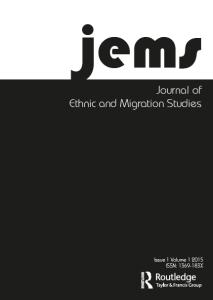 |
Panke, Diana (2017): The Institutional Design of the United Nations General Assembly: An Effective Equalizer? International Relations, Vol. 31 (1): 3-20.Most international organizations are based on the principle of equality of states. Their institutional design grants all member states the same formal rights. Although formally equal, states differ immensely concerning their power capacities and size. Can institutional designs of international organizations mitigate real-world power- and size-related differences between member states, and if so, to which extent? To provide an answer, this article focuses on the United Nations General Assembly, which combines an equalizing institutional design with a large very heterogeneous membership. It shows that the strength of the equalizing effect varies across stages of the policy cycle. It is the weakest in the negotiation stage and the strongest in the final decision-making stage, while institutional design of international organizations has a de facto equalizing effect of medium strength in the agenda setting stage. Thus, while power and capacity differences matter, larger powerful states are not systematically better off throughout the entire policy cycle. | |
Panke, Diana (2017): Speech is silver, silence is golden? Examining state activity in international negotiations. In: The Review of International Organizations, Vol. 12 (1): 121-146.The institutional design of international organizations usually expresses state sovereignty, as each state has the same formal rights and obligations. This includes equal speaking rights in international negotiations. Becoming vocal is a means for states to signal national interests and influence international norms as well as to express their sovereignty. However, an analysis of 520 international negotiations demonstrates that states vary considerably in the usage of speaking rights. To addresses this puzzle, the paper presents an opportunity structure-incentives model and puts its observable implication to a comprehensive empirical test. This reveals that states operating in favourable conditions, most notably in small IOs, and states pursuing a broad scope of interests, being powerful and having strong international identities are most active in international negotiations. By contrast, smaller states that can neither rely on support of regional groups, nor on a government apparatus that effectively develops national positions are least likely to benefit from an equalizing institutional design of an international negotiation arena. Hence, there are limits to the extent to which an equalizing institutional design of IOs and regimes is able to mitigate real world structural differences between states.
| |
Brazys, Samuel, Panke, Diana (2017): Push and Pull Forces in the UNGA: Analyzing Foreign Policy Change in the Context of International Norms. In: International Politics, Vol. 54 (6): 760-774.This paper proceeds from the observation that states at times change their foreign policy preferences vis-à-vis an international norm on reoccurring resolutions in the United Nations General Assembly. In order to explain this phenomenon, we utilize a push–pull approach capturing the impact of domestic (push) and international dynamics (pull) on foreign policy change concerning repeated international norms. The theoretical expectations are empirically examined in order to shed light on the causal pathways underlying foreign policy changes. To this end, the paper combines a descriptive analysis of over 150 UNGA resolutions with more than 50 interviews with diplomats and MFA members, an analysis of official documents and an examination of WikiLeaks material. The evidence illustrates that both domestic push and international pull factors account for shifting foreign policy positions on international norms. On the push side, we find that domestic political institutions, the norm context and state agency drive position change, whereas on the pull side, the international norm environment as well as the activities of third states and groups influence vote shifts. In addition, salience of the norm also matters, as high politics norms tend toward higher voting consistency, whereas states adjust foreign policies more frequently on resolutions concerning less-politicized low politics norms.
| |
Brazys, Samuel, Panke, Diana (2017): Analyzing Voting Inconsistency in the United Nations General Assembly. In: Diplomacy and Statecraft, Vol. 28 (3), 538 - 560.In many international institutions, contested norms pass via voting. Although votes express national positions, dynamic vote shifts are a widespread phenomenon. Why do states sometimes change their voting stances concerning re-occurring international rules and norms? To explain observed variation, this analysis theorises the role of domestic and external windows of opportunity as well as the role of lobbying in the United Nations General Assembly. It shows that changes in government composition and changes in the text of re-occurring international rules and norms matter. Yet, whilst resourceful actors more likely change their voting stance after having successfully negotiated text changes, less powerful states are more likely to shift voting stances in response to third party lobbying.
| |
Rüland, Jürgen (2017): Democratizing Foreign-Policy Making in Indonesia and the Democratization of ASEAN: A Role Theory Analysis. In: TRaNS: Trans –Regional and –National Studies of Southeast Asia, Vol. 5 (1): 49-73.With the resignation of President Soeharto in 1998 and subsequent democratization, Indonesia’s foreign policy underwent major changes. More stakeholders than under Soeharto’s New Order regime are now participating in foreignpolicy making. The country seemed to make democracy promotion a hallmark of its foreign policy, especially under the presidency of Susilo Bambang Yudhoyono (2004–2014). This raises the questions of whether and, if so, to what extent Indonesian democratization changed the country’s established foreign-policy | 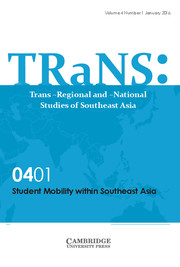 |
Müller, Lukas (2016): Beyond Actorness. Structure and Agency in EU-ASEAN Interregionalism. European Journal of East Asian Studies. .This paper is concerned with the determining factors of the interregional relationship between the European Union (EU) and the Association of Southeast Asian Nations (ASEAN), specifically its institutional proliferation on the three institutional levels of EU-to-ASEAN relations (bi-regionalism), relations inside ASEM (trans-regionalism) as well as relations between the EU and individual ASEAN member states (region-to-state). Commonly, interregional relations are seen as depending on the actorness of the regional organisations involved. This paper proposes an alternative approach, focusing on structural interdependence and agency on the part of both regional actors as the two main determinants of the institutional proliferation. The analysis suggests that levels of political and economic interdependence are low at the bi-regional level and higher at both the trans-regional and region-to-state level, leading to a proliferation of institutional structures at these levels. Additionally, the analysis reveals three unique strategies by ASEAN and the EU contributing to the design of their interregional relationship. For ASEAN, these strategies consist of (1) omni-enmeshment, (2) vertical and horizontal hedging, and (3) the rule of relative institutionalisation. For the EU, these strategies consist of (1) a pragmatic approach towards ASEAN, (2) a widening of interest towards East Asia, and (3) capacity-building bi-regionalism. |  |
Carrapatoso, Astrid & Well, Mareike (2016): REDD+ finance: policy making in the context of fragmented institutions. In: Climate Policy, Vol. 17 (6): 687-707.This article analyses the current institutional architecture of international finance for REDD + (reducing emissions from deforestation and forest degradation, and the role of conservation, sustainable management of forests and enhancement of forest carbon stocks in developing countries) and aims at a better understanding of the complementary or contradictory nature of existing funding mechanisms. Through the integration of REDD + into the Paris Agreement of the UN Framework Convention on Climate Change (UNFCCC), the scene is set for countries to use this political legitimacy and momentum to further REDD + implementation. How REDD + is and will be financed is still a defining question for its successful implementation. This study shows that the heterogeneity of international financial support for REDD + is an illustrative case for the phenomenon of institutional fragmentation. It explores to what extent the current setting of REDD + finance can be seen as a rational response to earlier governance challenges, and whether a setting of co-governing institutions may evolve towards a functional differentiation of governance tasks. By discussing the specific case of REDD + finance in Indonesia, the possible feedback effects of institutional fragmentation at the national level are also considered. The study finds that a strengthened coordination of the existing financing efforts is decisive for making the most of the strong commitment to REDD + reflected in the Paris Agreement. By including the perspective of functional differentiation, the article zooms in on the practical effects and opportunities of institutional fragmentation, thereby advancing current reasoning on this aspect of global environmental governance. | |
Carrapatoso, Astrid, Pistorius, Till & Reinecke, Sabine (2016): A historical institutionalist view on merging LULUCF and REDD+ in a post-2020 climate agreement. In: International Environmental Agreements: Politics, Law and Economics, Vol. 17 (25): 623-638.In the context of the UNFCCC negotiation process on a global climate agreement, policy makers are looking for approaches on how to significantly raise the mitigation ambition of all relevant sectors, including the land use sector. Aside of the formal negotiations some Parties to the UNFCCC have started an informal dialogue and discuss how to merge the fragmented accounting rules for mitigation relevant land use activities, in particular those concerning forest-sector emissions. Stressing that ‘history matters’, we use a historical institutionalist perspective to assess the institutional pathways of the different accounting rules for developed and developing countries, their mutual relationship, and in how far they are supportive or counterproductive for this endeavour. Our empirical analysis shows that Parties tend to use any modification phase in the negotiation process to water down already achieved agreements, and that negotiating modalities after targets have been agreed is not conducive either. In the efforts of specifying the Paris agreement, merging existing rules into a common accounting framework is likely to further compromise the exisiting weak rules and modalities, and potentially what negotiators consider as ‘environmental integrity’. With this, a formal negotiation of common rules for the accounting of the land use sector may yield an outcome below what has been achieved since the negotiations on a post-2020 agreement started in 2005. We conclude that politically acceptable approaches for the land use sector that also contribute to the overall objective of raising ambition should avoid reopening already agreed decisions on rules and modalities. | |
Huotari, Mikko & Heep, Sandra (2016): Learning geoeconomics: China’s experimental financial and monetary initiatives.In: Asia Europe Journal, Vol. 14 (2): 153-171.China’s rise is increasingly impacting on the global financial and monetary order. To manage its growing centrality in global financial flows and its new relevance for patterns of currency usage, Beijing has been creating a set of new institutional arrangements in three crucial fields: the provision of crisis liquidity, development financing, and a global infrastructure to internationalize its currency. In contrast to the dominant power political interpretation of such developments, this article highlights the strong linkages of Beijing’s new initiatives with the changes in China’s capitalist development path and stresses their experimental character that serves to manage the economic and political risks of China’s accelerating financial internationalization.With a distinct learning attitude regarding its rising geoeconomic prominence and engagement, Beijing’s risk-averse strategy involves a very careful linking, layering, and nesting of new arrangements. |  |
Michael, Arndt & Baumann, Marcel (2016): India and the dialectics of domestic andinternational “land grabbing”: Historicalperspectives, current debates, and the case of Ethiopia. In: India Review, Vol. 15 (1): 112-135.International land “acquisition” or land “grabbing” has become aglobal phenomenon in which India plays an increasingly importantrole. While there is a critical domestic debate regarding landdeals within India—especially pertaining to the provisions of theLand Acquisition Act of 2014 — there is practically no suchdebate regarding international land deals by Indian companiesin Sub-Saharan Africa. By applying a two-level discourse analysis,this article argues that the land discourse within India can beunderstood as a strategy of exclusion. By linking land issues withquestions of “development,” the discursive strategies of powerfulactors lead to the exclusion of the arguments of NGOs and othersopposed to the land deals from the discourse within India. Thisstrategy of exclusion is then taken to the extreme with thestrategy of securitization outside India: land deals are linked to“food security,” as the example of Ethiopia highlights. | 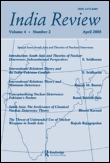 |
Rüland, Jürgen (2016): Why (most) Indonesian businesses fear the ASEAN Economic Community: struggling with Southeast Asia’s regional corporatism. In: Third World Quarterly, Vol. 37 (2): 1-16.By the end of 2015 the Association of Southeast Asian Nations (ASEAN) had ushered in a common market, the ASEAN Economic Community (AEC). However, the groups most affected by it – small businesses –were bypassed in the decision-making process. They are the victims ofa selectively inclusive state corporatism which member countries havetransferred from their domestic political system to the regional level.In this article I argue that the decision to create the AEC was promotedby ASEAN governments together with foreign economic and localcorporate interests. This coalition was able to frame the AEC in a waythat small businesses perceived it as a win-win scheme. Empiricallythe article focuses on Indonesia. | 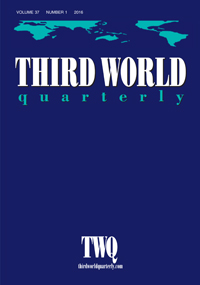 |
Mehler, Andreas, Zanker, Franzisca & Claudia Simons (2015): Spatiality, Power and Peace in Africa: Revisiting Territorial Power-Sharing. In: African Affairs, Vol. 114 (454): 72-91.Power-sharing agreements have become a blueprint for efforts to end violent conflicts in many parts of the world, particularly in Africa. Such agreements, however, rarely include territorial power sharing – at least, not according to the formal, rather unhelpful narrow definition that includes federalism and decentralization. This article argues that the concept of territorial power sharing needs to be broadened in order to account for the manifold informal or indirect manifestations of such arrangements. Drawing on extensive fieldwork data from the DRC, Liberia, and Kenya, the article analyses the history of spatiality and power in Africa in order to explain why formal mechanisms of territorial power sharing are rare and why more subtle types of informal territorial power sharing are much more common. Based on this analysis, we conclude that territorial power sharing is present in many African states, but that typically it is overlooked because of its informal nature.
| |
Steinhilper, Elias (2015): From "the Rest" to the West? Rights of Indigenous Peoples and the Western Bias in Norm Diffusion Research. In: International Studies Review, Vol. 17 (4): 536-555.This article discusses the construction and diffusion of the Rights of Indigenous Peoples (RIP). RIP have only scarcely been addressed in detail from a human rights (HR) norm diffusion perspective, yet it is instructive for gaining further insights into norm dynamics, due to the marginalization of indigenous communities within their countries of origin as well as the concentration of indigenous populations in the Global South. RIP have hence been qualified as a “least likely” case for internationalization. Mainstream diffusion literature has mostly focused on the proliferation of liberal Western norms, radiating from “the West” to “the Rest.” Powerful Western states as norm entrepreneurs have been explicitly included into models of normative change (for example, the spiral model). My qualitative process tracing research, however, presents a distinct pattern: Indigenous peoples themselves, in alliance with transnational advocacy networks and sympathetic states (to a considerable extent Latin American), have succeeded in constructing a new HR norm manifested in the UN Declaration on RIP. Among the skeptical norm takers were mainly liberal democracies such as the United States. To understand this puzzle, I combine Acharya's norm localization concept with its focus on “cognitive priors” with the norm appropriation framework recently suggested by Großklaus. |  |
Bock, Andreas M./ Henneberg, Ingo/ Plank, Friedrich (2015): “If you compress the spring, it will snap back hard”: The Ukrainian crisis and the balance of threat theory. In: International Journal, Vol. 70 (1): 101-109.The narrative of an aggressive and neo-imperialist Russia that has dominated analyses of the 2014 Ukrainian crisis lacks theoretical rigour. We argue that a sustainable transformation of the Ukrainian crisis requires an accurate analysis of the context of the conflict, which should include an understanding of Moscow’s perception of the threats to its interests. This policy brief develops a theoretical understanding of the Ukrainian crisis through the lens of Stephen M. Walt’s balance of threat theory. We conclude that a realist analysis will help to explain Russian actions. |  |
Michael, Arndt (2014): Advent of a ‘Game Changer’?: India’s Economic, Political and Strategic Engagement in Sub-Saharan Africa from 1991 until 2014. In: India Quarterly: A Journal of International Affairs, Vol. 70 (4): 341-357.In her position as a rising power, India has reassessed and reinvigorated the entirety of her relations with Africa in the past decade. These relations cover the economic, political and the security spheres. They are the result of India’s ideational foreign policy change, her economic growth trajectory, looming energy insecurity and India’s role as an increasingly important international stakeholder. The main argument of the article is that India has successfully worked out her own policies, institutional structures and inter-regional development schemes with unique characteristics to develop and deepen linkages with sub-Saharan Africa. The article concludes that India now has a potential of assuming the role of ‘game changer’ in the new scramble for Africa’s resources and the struggle for votes and support of African states in international institutions and fora. | 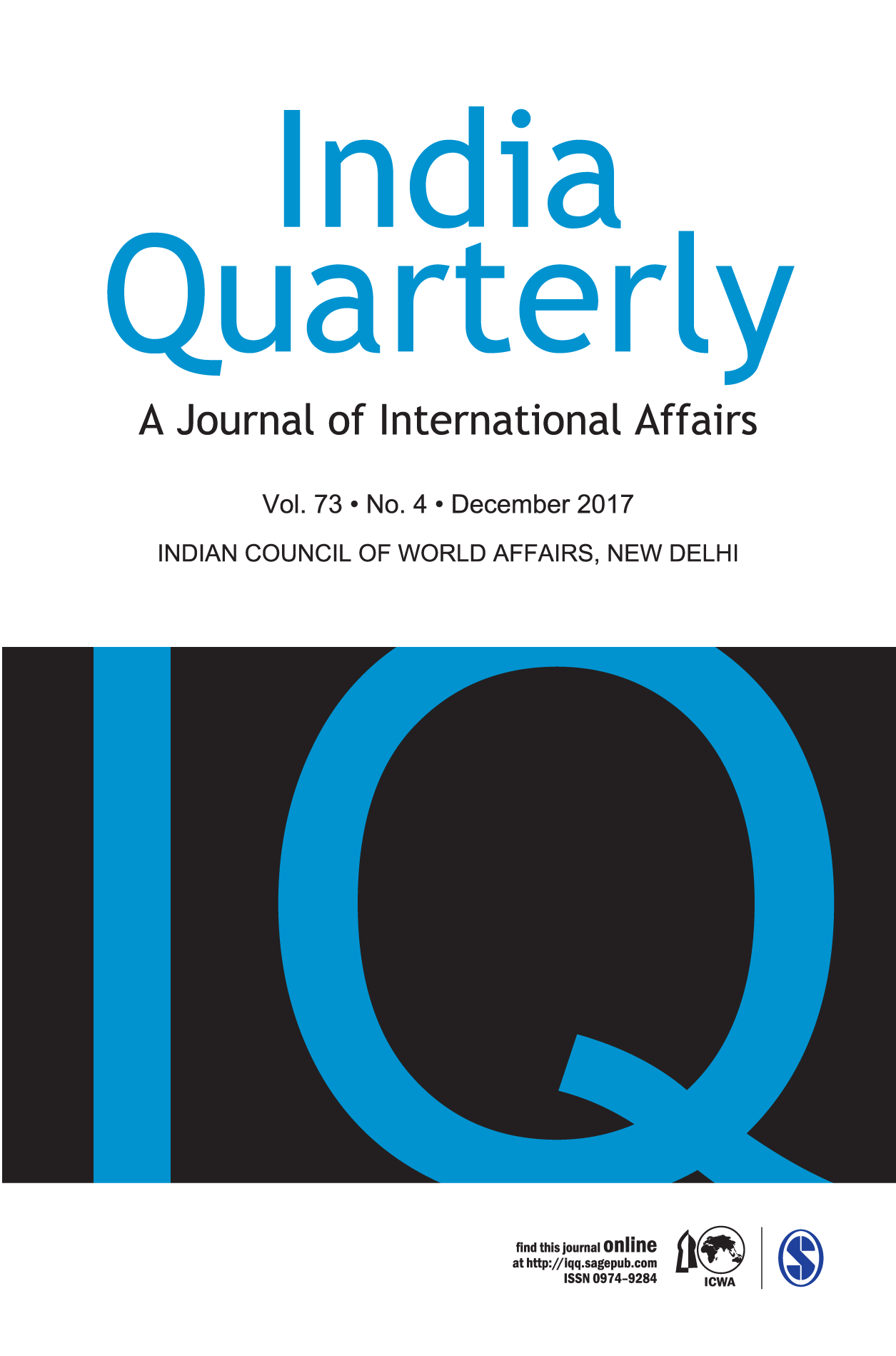 |
Huotari, Mikko & Hanemann, Thilo (2014): Emerging Powers and Change in the Global Financial Order. In: Global Policy, Vol. 5 (3): 298-310.Emerging economies have become a major force in the world economy. This article examines the role of Brazil, Russia, India and China (BRIC) in global finance and compares their potential to challenge the parameters of international financial and monetary relations. Instead of focusing on changes inside the existing system of multilateral governance, our analysis stresses the need to consider a broader set of channels to develop and exert financial power. Our comparative assessment of BRIC economies’ increasing autonomy, their strategic intentions, financial system capacity and the behavior of subnational ‘power brokers’ in global financial markets serves as a starting point to advance the debate over ongoing structural changes in the global financial order. We show how increasing autonomy and financial power have already led emerging markets to develop alternatives for crisis financing and development assistance. The prospects for deeper cooperation among BRIC economies however remain gloomy, as the already very diverse preferences with regard to global financial structures can be expected to further diverge. | 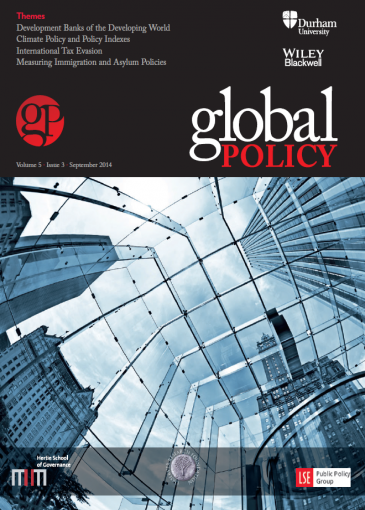 |
Huotari, Mikko & Rüland, Jürgen (Eds.) (2014): Special Issue: Context, Concepts and Comparison in Southeast Asian Studies. In: Pacific Affairs, Vol. 87 (3): 415-439.Debating the challenges of comparisons in Southeast Asian studies, the objective of this Special Issue is to advance the agenda of context-sensitive and methodologically reflected Comparative Area Studies (CAS). As a deliberate attempt to infuse new meaning into the embattled genre of area studies, CAS seeks to overcome increasingly rigid (sub-)disciplinary barriers often constructed around methodological arguments. Moreover, through stepping up the inclusion of non-Western regions in the research agenda, CAS also makes a decided bid to transcend the usually strongly Western-centric theory-building in most social science disciplines. This introduction locates the following articles in the broader context of the area studies-discipline divide. It highlights how the challenges of comparative research practice on different layers of social reality are at the heart of this divide but at the same time provide a productive ground for exchange in interdisciplinary Southeast Asian studies. We expand on the contributing authors’ arguments by providing a typology of comparative research practice that captures the value of various forms of area studies comparisons and by reflecting on the conceptual preconditions for fruitful comparisons. |  |
von Lübke, Christian (2014): Modular Comparisons: Grounding and Gauging Southeast Asian Governance. In: Pacific Affairs, Vol. 87 (3), 509-538. |
|
Wenzelburger, Georg (2014): Blame avoidance, electoral punishment and the perceptions of risk. In: Journal of European Social Policy, Vol. 24 (1): 80-91.Recent findings about the electoral cost of welfare state retrenchment challenge the view of the ‘New Politics’ literature that cutting welfare state entitlements is electorally risky. In fact, there seems to be no systematic punishment for governments retrenching the welfare state. At the same time, however, studies show that governments use numerous blame avoidance strategies when cutting welfare. Reflecting on this apparent contradiction we put forward two points. First, qualitative evidence from interviews with political leaders suggests that it is not the actual risk of being punished that entices politicians to use blame avoidance but the perception of this risk. This explains why blame avoidance strategies are widely used. Second, the existing studies showing that governments are not systematically punished for cutting the welfare state suffer from the lack of control for blame avoidance effects. We show that an experimental design could be a remedy for this problem. | 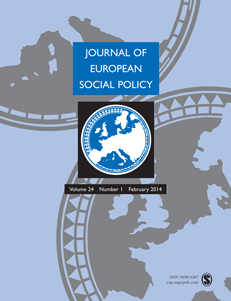 |
Wenzelburger, Georg (2015): Parties, Institutions and the Politics of Law and Order: How Political Institutions and Partisan Ideologies Shape Law-and-Order Spending in Twenty Western Industrialized Countries. In: British Journal of Political Science, Vol. 45 (3): 663-687 [online first: January 2014].Although the politics of law and order are currently a major issue of debate among criminologists, comparative public policy research has largely neglected it. This article fills that gap by bringing together criminological and public policy theories, and by examining law-and-order policies in twenty Western industrialized countries. It adds to the existing literature in two important ways: it provides a straightforward quantitative test of the existing criminological explanations of law-and-order policies using public spending as the dependent variable; and it shows that governments’ partisan ideology matters for law-and-order policies. Government ideology influences how much countries spend on public order and safety, but the effect depends on the budgetary room for manœuvre and the strength of institutional barriers. | 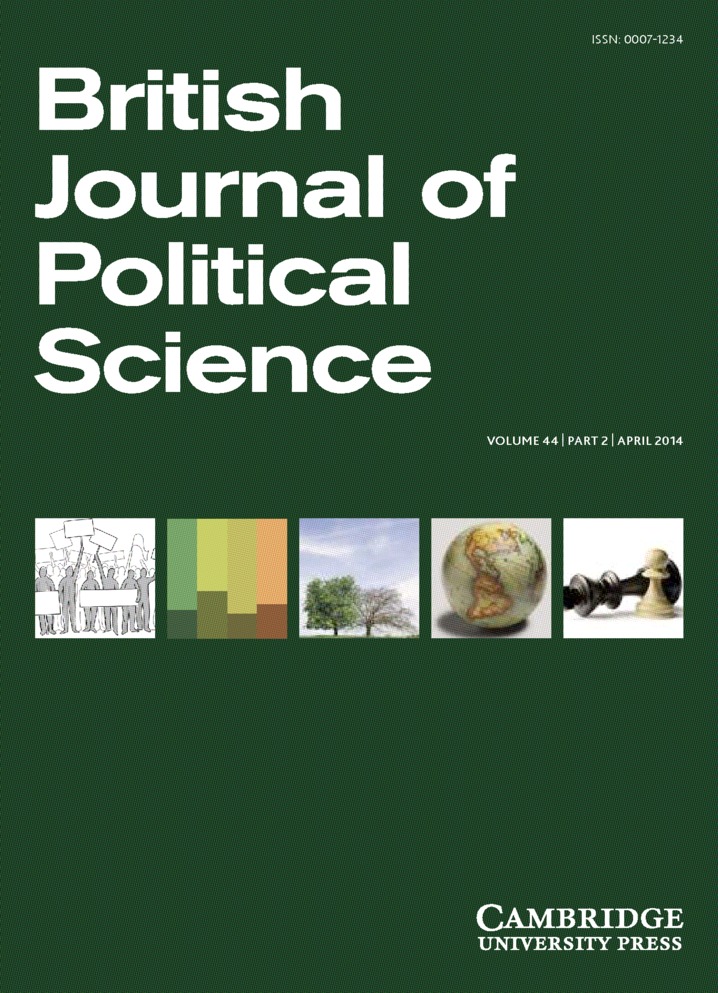 |
Rüland, Jürgen & Bechle, Karsten (2014): Defending state-centric regionalism through mimicry and localisation: regional parliamentary bodies in the Association of Southeast Asian Nations (ASEAN) and Mercosur. In: Journal of International Relations and Development, Vol 17 (1): 61-88.The creation of parliamentary bodies for regional organisations such as Association of Southeast Asian Nations (ASEAN) or Mercosur seems to be at odds with the intergovernmental logic on which these organisations rest. We approach this puzzle from the perspective of norm diffusion theory. In the article we argue that transnational legislative bodies in Southeast Asia and South America have been primarily established to retain the respective organisation’s ‘cognitive prior’, which in both cases rests upon deeply entrenched corporatist norms and ideas. We test our theoretical claims by a comparative study on the emergence and evolution of the ASEAN Inter-Parliamentary Assembly and the Mercosur Parliament. | 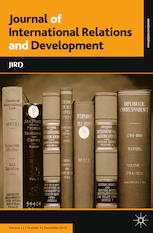 |
Rüland, Jürgen (2014): Constructing Regionalism Domestically: Local Actors and Foreign Policymaking in Newly Democratized Indonesia. In: Foreign Policy Analysis, Vol. 10 (2): 181-201.There is a dearth of studies exploring the construction of ideas on regionalism outside Europe. This article seeks to make a contribution to close this gap. It examines the construction of ideas on regionalism in Indonesia, the largest member country of the Association of Southeast Asian Nations (ASEAN). Theoretically, the paper draws from Acharya's concept of “constitutive localization” which it develops further. It offers an alternative explanation to studies which argue that as a result of mimetic behavior, social learning, and cost-benefit calculations, regional organizations across the world become increasingly similar. While this may be the case in terms of rhetoric and organizational structure, it is not necessarily the case at a normative level. The Indonesian case shows that even though foreign policy stakeholders have increasingly championed European ideas of regional integration after the Asian Financial Crisis of 1997/1998, they have skillfully amalgamated them with older local worldviews through framing, grafting, and pruning. European ideas of regional integration thereby served to modernize and relegitimize a foreign policy agenda which seeks to establish Indonesia as a regional leader with ambitions to play a major role in global politics. | 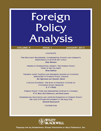 |
Rüland, Jürgen (2012): The limits of democratizing interest representation: ASEAN’s regional corporatism and normative challenges. In: European Journal of International Relations, Vol. 20 (1): 237-261.This article addresses the problem of interest representation in regional organizations. Departing from a theory-guided four-dimensional typology, the study explores how the Association of Southeast Asian Nations (ASEAN) responded to normative challenges of its system of interest representation. The findings suggest that ASEAN has skilfully countered external democracy promotion and domestic pressures for democratizing regional governance through variable strategies including rejection, isomorphic adaptation and localization. The multiple strategies employed by the grouping have largely kept intact its ‘cognitive prior’ which rests on a blending of imported European and older local organicist ideas. Given the resilience of this cognitive prior, the prospects for a wholesale liberal-pluralist transformation of ASEAN’s system of interest representation appear dim. | 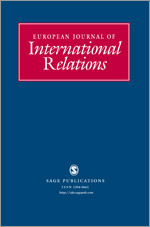 |
Nguitragool, Parudee (2012): God-King and Indonesia: Renegotiating the Boundaries between Western and Non-Western Perspectives on Foreign Policy. In: Pacific Affairs, Vol. 85 (4): 723-743.The critique of Westerncentrism in knowledge production in the discipline of international relations (IR) has led to attempts to incorporate regional experiences into the mainstream IR theorization. Ambivalence and challenges remain, however. They arise from the similar and shared histories that make distinguishing Western and non-Western ideas and theories difficult. Seeking to contribute to the debate on Westerncentrism in IR theorization, I examine the cultural sources and history of political realism in Java. By tracing the history of struggles, political practices and ideas such as the God-King, problems related to some contemporary IR theories become evident. The boundaries between Western and non-Western political thinking, however, become less pronounced. |  |
Piper, Nicola & Rother, Stefan (2012): Let´s Argue about Migration: advancing a right(s) discourse via communicative opportunities. In: Third World Quarterly, Vol. 33 (9): 1735-1750.The emerging global governance of migration is dominated by two discourses which shape policy approaches: 1) migration management and 2) the migration–development nexus. With large numbers of labour migrants being marginalised, migrant rights organisations have formed global alliances to argue for the centrality of a third discourse, the rights-based approach to migration. The question is how to inject this into the global debate which has sidelined migrant rights issues. Despite having hardly any bargaining power and restricted space for direct access vis-a`-vis global governing institutions, migrant rights organisations are employing a number of strategies to overcome this marginalisation. We analyse these efforts by drawing on social movement studies and International Relations research on communicative action. Empirically this article draws on observations made during two major global fora: the negotiations in connection with the new Convention on ‘Decent Work for Domestic Workers’ at the International Labour Conference (ILC) and civil society participation in the Global Forum on Migration and Development (GFMD). |  |
Rüland, Jürgen (2012): Introduction to the First Four Articles: Governance, Decentralisation and Democratisation in Southeast Asia. In: European Journal of East Asian Studies, Vol. 11: 5-16.Decentralisation is one of the most enduring and contested themes in the development discourse. The concept has gone through ebbs and flows, normative and functional variants, wide and narrow definitions. Although it has been part of changing academic fashions, in six development decades it has never disappeared from the agenda of development theorists, practitioners and donor organisations. |  |
von Lübke, Christian (2012): Striking the Right Balance. Economic Concentration and Local Government Performance in Indonesia and the Philippines. In: European Journal of East Asian Studies, Vol. 11: 17-44.The relationship between economic concentration and governance remains controversial. While some studies find that high economic concentration strengthens collective action and reform cooperation, others stress dangers of rent-seeking and state capture. In this paper I argue that effects are neither strictly positive nor negative: they are best described as an inverted u-shaped relationship, where better governance performance emerges with moderate economic concentration. Decentralisation reforms in Indonesia and the Philippines— unprecedented in scope and scale—provide a unique opportunity to explore this thesis. Subnational case studies and cross-sectional data analyses indicate that moderately concentrated polities in both countries are accompanied by more effective and less corrupt service provision. The presence of ‘contested oligarchies’—a small but diverse pool of economic elites—paves the ground for more balanced policy arenas; they contribute to a scenario where private sector actors are strong enough to influence government decisions and, at the same time, diverse enough to keep themselves and public officials in check. |  |
Nguitragool, Parudee (2012): Environmental Governance in Democratic and Decentralised Indonesia: Between State, Family and Conservation. In: European Journal of East Asian Studies, Vol. 11: 45-69.As it involves devolution of political and fiscal powers, decentralisation is widely seen as a significant step towards good governance. Although democratic reform and decentralisation have had some positive impacts in terms of access and accountability, I argue that environmental governance in Indonesia still suffers largely from the lack of social cohesion caused by the weaknesses of the conservation norms, modernisation and fragmentation along the axis of class inequality and identity politics. |  |
Mansrisuk, Chaiwatt (2012): Decentralization in Thailand and the Limits of the Functionalist Perspective of Institutional Reform. In: European Journal of East Asian Studies, Vol. 11: 71-97.Thailand has adopted democratic decentralisation since the mid-1990s. The reform agenda has primarily influenced by the functionalist view of institutional reform which depicts institutional effects as the intended consequences of their creators’ action. It emphasises the significance of ‘technocratic expertise’ and ‘rationality’ in pursuing institutional reform, and, hence, overlooks complexities and difficulties which may obstruct institutional change. The experience of decentralisation in ailand seems to contradict the conventional wisdom of the functionalist approach. e implementation of the decentralisation reform in Thailand has not completely achieved initial policy objectives, but, it, instead, produced unintended consequences. This paper empirically provides insights into the dynamics of decentralisation in Thailand which theoretically exposes the limits of the functionalist view of institutional reform. |  |
von Luebke, Christian & Patunru, Arianto A. & McCulloch, Neil (2012): A Tale of Two Cities: The Political Economy of Local Investment Climates in Indonesia. In: Journal of Development Studies 48 (7): 799-816.There is little doubt that protecting property rights, reducing corruption, and improving public services are desirable long-term objectives for all countries. But are such institutional prescriptions sufficient, or even necessary, to achieve investment and growth? By exploring the political economy of the cities of Solo and Manado in Indonesia, this article shows that relationship-based, rather than rule-based, cooperation between government leaders and local firms can provide an effective mechanism to boost investment and improve local investment climates. Our findings challenge the conventional wisdom that impartial rule-based economic governance is a precondition for investment, although it suggests that the creation of such institutions may make growth more sustainable and equitable in the medium and long term. |  |
Rother, Stefan (2012): Wendt meets East: ASEAN cultures of conflict and cooperation. In: Cooperation and Conflict, Vol. 47 (1): 49-67. | 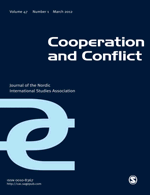 |
Rüland, Jürgen (2012): The rise of "diminished multilaralism": East Asian and European forum shopping in global governance. In: Asia Europe Journal, Vol. 9 (2-4): 255-270.The article argues that the "principled multilateralism" of the immediate post-Cold War period is increasingly giving way to what may be called a "diminished multilateralism." Newly emerging global and regional powers such as the BRICS states (Brazil, Russia, India, China, and South Africa) and other rising powers in the Global South are increasingly questioning the legitimacy of the existing international architecture which they regard as a vehicle of the USA and Western countries to conserve their international influence in an era of rapid change. In the process, international institutions have increasingly become arenas of power rivalries which take the form of contests over access and membership, decision-making rules and normative order. The result is an increasing paralysis of these institutions and their inability to solve global problems. One aspect of these institutional power struggles is "forum shopping." The article shows that East Asia and Europe have both become active players in forum shopping. Three conditions facilitated forum shopping: major crises and external shocks; sentiments of frustrated entitlement in connection with exclusive and discriminatory international institutions, and extra- and intra-regional power shifts. | 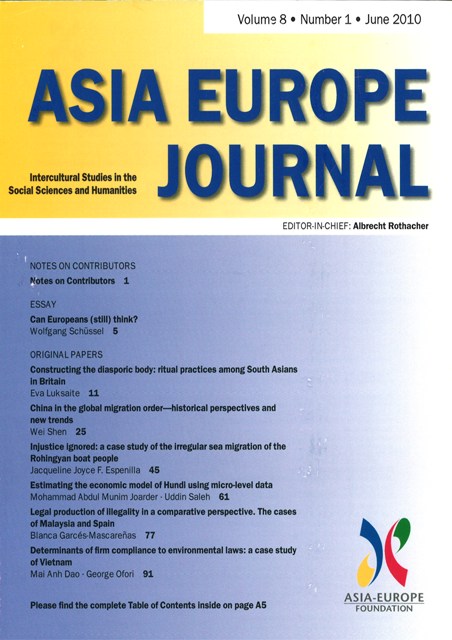 |
Carrapatoso, Astrid (2011): Climate policy diffusion: interregional dialogue in China-EU relations. In: Global Change, Peace & Security, Vol. 23 (2): 177-194. | 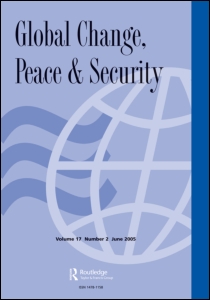 |
Nguitragool, Paruedee (2011): Negotiating the Haze Treaty: Rationality and Institutions in the Negotiations for the ASEAN Agreement on Transboundary Haze Pollution (2002). In: Asian Survey, Vol. 51 (2): 356-378.This article examines ASEAN's cooperation on transboundary haze pollution. I argue that ASEAN's creation of the haze treaty in 2002 demonstrates its attempt to depart from certain elements of the institutional culture. But both ASEAN's treaty and cooperation have been hindered by certain normative constraints, organizational customs, and domestic politics. | |
Rüland, Jürgen (2011): Southeast Asian Regionalism and Global Governance: "Multilateral Utility" or "Hedging Utility"?. In: Contemporary Southeast Asia, Vol. 33 (1): 83-112.Regional organizations are widely regarded as building blocks of a multilateral order. But this view ignores the fact that regional organizations vary in their contribution to multilateralism. This article therefore adds to Dent's established concept of "multilateral utility" the concept of "hedging utility" which I claim better captures the behaviour of many non-Western regional organizations including the Association of Southeast Asian Nations (ASEAN). In the theory-guided part the article develops six indicators to distinguish the two types of regional organizations: level of institutionalization, governance costs, nesting, agenda-setting, norm entrepreneurship and mode of interaction. Based on these categories, the article examines ASEAN's role as a contributor to a multilateral order. The findings illustrate that indeed "hedging utility" rather than "multilateral utility" better describes ASEAN's agency in shaping international order. The hedging concept resonates well with elite notions of Southeast Asian political culture and also captures the institutional balancing dimension of ASEAN's (security) policies. | |
Rüland, Jürgen (2010): Balancers, multilateral utilities or regional identity builders? International relations and the study of interregionalism. In: Journal of European Public Policy, Vol. 17 (8): 1271-1283.This article presents an overview on the state of the art of research on interregional relations. It clarifies underlying concepts and focuses on the theory-guided literature exploring the functions of interregional forums for the emerging global governance architecture. Empirical evidence provided by many of the reviewed studies suggest that interregional relations are part of complex institutional balancing games played by regions which curtail their potential as multilateral utilities. Empirical studies examining norm diffusion between regions are still in their infancy. This leaves considerable space for innovative research going beyond the notion of the EU as a “normative power” trying to persuade other regions to adopt its model of regional integration. |  |
Wenzelburger, Georg (2009): The Analysis of Budget Consolidations: Concepts, Research Designs and Measurement. In: Journal for Economic and Social Measurement, Vol. 34 (4): 269-291.Fiscal adjustments have been examined from different perspectives in the literature. However, the conceptual approaches to the analysis of budget consolidations vary substantially. Therefore different approaches to the analysis of fiscal adjustments are discussed in a first step. It is shown that the choices regarding the underlying concepts lead to specific research designs and influence the appropriate empirical method. In a second step, the determinants of budget consolidations are examined empirically in four different research designs for 23 industrialised countries in the 1990s. The analysis shows that the results vary depending on the method applied. However, economic variables seem to play the most important role in explaining the consolidation performance |  |
Rüland, Jürgen (2009): Deepening ASEAN cooperation through democratization? The Indonesian legislature and foreign policymaking. In: International Relations of the Asia-Pacific, Vol. 9 (3): 373-402.Recent reforms of the Association of Southeast Asian Nations (ASEAN) are viewed by liberal institutionalists and constructivists as triggering a fundamental transformation of the ASEAN Way, the embodiment of the association's established, strictly intergovernmental cooperation norms. This article questions such reasoning, if it is causally linked to expectations of a greater deepening of ASEAN cooperation. Based on recent rationalist theorizing and Snyder's 'nationalist elite persuasion' hypothesis, the article argues that the causal relationships between democracy and regional integration are more complex than assumed in Eurocentric integration theories. By examining goreign policy debates in the Indonesian legislature, the article shows that foreign plicymaking has become much more democratic and pluralistic since the end of President Suharto's New Order regime. However, as case studies of foreign policy issues suggest, democratic norms have often been localized by a neo-nationalist agenda that hamstrings the deepening of regional integration. |  |
Jetschke, Anja (2009): Institutionalizing ASEAN: celebrating Europe through network governance. In: Cambridge Review of International Affairs, Vol. 22 (3): 407-426.This article provides a new piece for two of the puzzles of institutionalized cooperation in Association of Southeast Asian Nations (ASEAN). First, with regard to the organization's four decades of existence, there has always been a marked gap between ASEAN's rhetorical goals of cooperation and its actual achievements. What explains these systematic failures of implementation? Second, from the outset, ASEAN was criticized for its light institutionalization, which failed to deliver the substantial cooperation goals. Despite selected institutional reforms, ASEAN's autonomy has not increased remarkably and it has not made any major institutional innovations. Why does ASEAN design institutions it does not use? Why does this transformation gap occur? The author suggests a sociological institutional explanation and argues that major impulses for cooperation have come from outside Southeast Asia, most importantly from Europe. By mimicking the European integration process, ASEAN member states have effectively created an isomorphic organization. The Association's institutional development reflects a concern for international legitimacy and less an objective functional demand arising from the specific interactions of member states. This copying process has led to network governance within the organization. |  |
Rüland, Jürgen & Kessler, Christl & Rother, Stefan (2009): Democratisation Through International Migration? Explorative Thoughts on a Novel Research Agenda. In: European Journal of East Asian Studies, Vol. 8 (2): 161-179.The article provides an introduction into this EJEAS issue on democratisation and international migration. Third Wave democratisation and the recent unprecedented increase in international labour migration may have the same structural origins, but so far few attempts have been made to link the two research agendas. One explanation might be that existing research on democratisation has neglected the exogenous dimension, and that migration research was preoccupied with destination countries. By drawing from the contributions to this Issue and the literature on norm diffusion, we argue that migrants have the potential to act as norm entrepreneurs and as agents of democratisation. The article maps out three avenues of norm diffusion: Migration can be the cause for changes of political attitudes at the individual level, it can be an enabling factor for collective action and it may lead to institutional change at the national and global level. To further assess how precisely these pathways might support or impede democratisation, more theory-guided empirical studies on the subject are urgently needed. . |  |
Jetschke, Anja & Rüland, Jürgen (2009): Decoupling rhetoric and practice: the cultural limits of ASEAN cooperation. In: The Pacific Review, Vol. 22 (2): 179-203.Why have ASEAN member states declared and why do they continue to declare their intention to enhance cooperation and devise projects when implementation lags behind their rhetoric? Why do they rhetorically commit themselves to cooperation, when they continue to stick to self-interested policies to the detriment of ASEAN's collective interest? And given these diverging practices, how likely is it that the objective of a more legalized and binding cooperation associated with the recently ratified ASEAN Charter is being implemented? This article draws attention to ASEAN's hybrid or dual character of international cooperation, consisting of the emulation of the European integration project and the persistence of deeper cultural strata of Southeast Asia's cooperation project that determine the limits of cooperation: Southeast Asia's social structure and political culture that have not produced those mechanisms that might facilitate international cooperation. If our explanation is correct that cooperation within ASEAN comes about as a simultaneous process of emulation and established cultural practices, we expect change only under specified conditions. Based on our argument and the theoretical literature on normative change, we identify and discuss in greater detail three potential outcomes of change: inertia, localization and transformation. The three modes make different predictions concerning change within ASEAN. Based on an analysis of the two major shocks with which ASEAN has had to contend in the last two decades, namely the Cold War in Asia and the Asian financial crisis, we argue that ASEAN's dominant response to major ideational challenges has been combinations of localization and inertia and has not been followed by a fundamental change of practice. |  |
Rother, Stefan (2009): Changed in Migration? Philippine Return Migrants and (Un)Democratic Remittances. In: European Journal of East Asian Studies, Vol. 8 (2): 245-274.The link between development and migration has been termed the 'new development mantra'. Studies on the subject have so far mostly focused on economic remittances, and the potential consequences of return migration on democratisation have been rarely touched upon. This article attests the potential of the migration experience to affect migrants' attitudes towards democracy, thus playing an important role in the diffuse support needed for democracies in the stage of consolidation. Based on a survey among 1,000 Philippine return migrants from six destinations, the paper suggests that the migration experience may not only lead to a more critical stance towards the political system of the home country; there are also indicators of lesser support for the principles of democracy when compared to migrants about to leave the country for the first time. The political system of the destination as such seems to be a less decisive factor than the specific freedoms and restrictions experienced by migrants and a potential bias when selecting the destination. The article focuses on return migrants from Saudi Arabia, Hong Kong and Japan, which showed the most distinctive numbers in support of democracy or changes therein when compared to first-time migrants heading for that destination. |  |
Baumann, Marcel M. (2009): Understanding the Other’s “Understanding” of Violence: Legitimacy, Recognition, and the Challenge of Dealing with the Past in Divided Societies. In: International Journal of Conflict and Violence, Vol. 3 (1): 107-123.Post-conflict societies which have achieved a cessation of violence and embarked on a political conflict transformation process cannot in the long-term avoid a process of dealing with the past. Case studies of South Africa and Northern Ireland confirm this normative claim, showing that within the post-war society as a whole a social consensus on how to “understand” and “recognize” the use of violence that occurred during the conflict is necessary: understanding the other’s “understanding” of violence. A mutual understanding must be reached that both sides fought a campaign that was just and legitimate from their own perspective. The morality of the “other’s violence” has to be recognized. |  |
Manea, Maria-Gabriela (2009): How and why interaction matters. In: Cooperation and Conflict, Vol. 44 (1): 27-49.The aftermath of the Cold War has brought a shift in the West's position on the acceptance and promotion of international human rights standards in developing countries. In this context, the Association of Southeast Asian Nations (ASEAN) member countries challenge the West's position based on two contradictory principles — comprehensibility and cultural embedment of human rights. In this article, I argue that interactions with regard to human rights involving state and non-state actors in ASEAN have become part of the process of regional identity formation. How ASEAN has responded to external pressures in terms of compliance with international human rights norms, and how it has developed its own normative and procedural approach to human rights at the regional level, are inherent in the dynamics of `Self' definition. A mixed pattern of `rhetorical' and `communicative action' explains how interaction has led to different phases — differentiation, affirmation, contestation and re-orientation — in the dynamics of `Self' definition of ASEAN with regard to human rights. |  |
Wagschal, Uwe & Wenzelburger, Georg (2008): Roads to success: budget consolidations in OECD countries. In: Journal of Public Policy, Vol. 28 (3): 309-339.During the 1990s, some OECD countries succeeded in reducing their budget deficits. The average public debt ratio fell from more than 70 per cent of GDP in 1996 to about 63 per cent of GDP in 2001. Up to now, researchers have mainly focused on the economic effects of these consolidation efforts. This paper answers another question: How can balanced budgets be achieved? By means of a detailed review of nine budget consolidations, the study identifies different roads to successful fiscal adjustments, starting with a critical review of the definition of budget consolidation. We find a pattern on the expenditure side that follows different worlds of the welfare state. On the revenue side however, the tax structure seems to be more path-dependent and mainly driven by long-term developments. In the last section, we show that institutional reforms constitute very important components of budget consolidations. |  |
Rüland, Jürgen & Jetschke, Anja (2008): 40 years of ASEAN: perspectives, performance and lessons for change. In: The Pacific Review, Vol. 21 (4): 397-409.In this introduction, the editors trace the increasing theoretical diversity of ASEAN research and discuss the contributions to this issue against the current state of the art. Contributions confirm the post-Asian crisis advancement of constructivist scholarship, but by also analyzing ASEAN from the Liberal and English school perspectives, the articles assembled in this issue nevertheless stand for theoretical pluralism. This article continues to open a governance perspective and, against this background, attests to ASEAN's marked success in pacifying an erstwhile turbulent world region but also to ASEAN's much more ambiguous record in responding to the new challenges associated with globalization. |  |
Baumann, Marcel M. (2008): The Trouble with the Peace Science's "Trouble Makers". In: Peace Review, Vol. 20 (4): 455-461.Many peace researchers are fascinated by violent confrontations or conflicts around the globe. This fascination stimulated peace “scientists” to study the “normal” daily lives of people in violent conflicts, i.e. in “abnormal” situations. A massive trend towards empirical social research, field studies and field observations followed. Theories were formulated, conflict transformation processes designed and conflict resolution handbooks published. Out of this fascination and the practical consequences for research agendas a new scientific debate is currently evolving: Are there or should there be certain moral constraints or ethical barriers to empirical social research, being carried out in the midst of violence conflicts? This essay tries to elaborate on this question. Reflecting on his previous work, the author argues that research in conflict-ridden societies is in need of common basic ethical principles. Peace science is neither about pacification, nor on co-optation. Rather it is a radical challenge to the status quo — a constant “trouble making” exercise. Hence, piece researchers have been aptly characterized as “natural troublemaker.” |  |
Manea, Maria-Gabriela (2008): Human rights and the interregional dialogue between Asia and Europe: ASEAN-EU relations and ASEM. In: The Pacific Review, Vol. 21 (3): 369-396.Since the early 1990s, human rights have been a contentious issue for relations between the Association of Southeast Asian Nations (ASEAN) and the European Union (EU), especially in the Asia-Europe Meeting (ASEM). It is an issue that has constantly led to tensions in interregional cooperation. However, the ASEAN-EU dialogue on human rights has, in fact, had a significant impact on regional dynamics by stimulating the process of regional identity formation, especially in Southeast Asia. The core mechanism through which this development takes place is that of interaction, the process in which the two regional groupings engage while negotiating human rights policy. It can be argued, therefore, that interregional and intraregional human rights interactions are mutually dependent. ASEAN's rather confrontational mode of interaction with the European Union in relation to human rights has served as a catalyst for the dynamic growth of a collective definition of self in ASEAN. It has led to an 'essentialization' of ASEAN's idea of self as opposed to a common other, something which has undermined the possibility of maintaining an interregional dialogue that is not confrontational. However, it has also contributed to the development of a regional space for communicating about human rights and has thus played a central role in the gradual transformation of ASEAN's collective identity formation. |  |
Fritz Carapatoso, Astrid (2008): Environmental aspects in free trade agreements in the Asia-Pacific region. In: Asia Europe Journal, Vol. 6 (2): 229-244.The trade and environment interface has become a topic of growing importance. Until the early 1990s, the General Agreement on Tariffs and Trade (GATT) and its successor, the World Trade Organisation (WTO), were the major forums to address the relationship between trade and the environment. Significant progress in this area has not yet been made. Since the 1990s, environmental issues have been addressed by the North American Free Trade Agreement (NAFTA) and in recent times by trans-regional and bilateral free trade agreements (FTAs) such as the Trans-Pacific Strategic Economic Partnership Agreement (SEP), the U.S.–Singapore FTA (USSFTA), the Canada–Chile FTA or the New Zealand–Thailand Closer Economic Partnership Agreement (CEP). Not only questions on the effectiveness of FTAs in global and regional environmental governance arise but also on the various actors involved in these negotiations. The question here is whether the integration of environmental issues in FTAs is a top-down approach, leaving the negotiations and implementation of environment cooperation frameworks in the hands of governments, or whether environmental arrangements are the result of a multi-stakeholder dialogue, consequently committing governments, the private sector and civil society to the objective of making trade and environmental policies mutually supportive. This article seeks to address these questions by analysing environmental issues and stakeholder participation in the Asia-Pacific Economic Cooperation (APEC), the Trans-Pacific SEP and the New Zealand–Thailand CEP. |  |
Menniken, Timo (2007): Lessons from the Mekong - China's Performance in International Resource Politics. In: Contemporary Southeast Asia, Vol. 29 (1): 97-120.Against the backdrop of population and economic growth Chinas water resources are getting scarcer. Uneven regional distribution and increasing pollution further reduce the locally available resources. Domestic measures applied to tackle the problems deriving from this scarcity produce international effects, giving rise to the apprehension that China will have to quench its thirst by increasingly exploiting sources that do not stem from or remain within its own territory.Chinas performance in international negotiations over water as well as in the regional Mekong regime reveals that to China transboundary cooperation is more a strategic option than a normative commitment. This article argues that alliances confronted with the impacts of Chinese water policy should focus on counterbalancing rather than just criticizing or even ignoring Chinese ambitions. With China being in a dominant position hydrologically, as well as politically, a second strategy would be issue linkage: offering incentives in non-water fields in return for cooperative management of shared water resources. |  |
Fritz Carrapatoso, Astrid (2007): The Integration of Trade and Environmental Policies in Free Trade Agreements in Southeast Asia. In: Südostasien aktuell, Vol. 1/2007: 77-105.The integration of trade and environmental policies is part of the international sustainable development agenda. How trade and environmental policies could be designed in a way which makes them mutually supportive is discussed not only on a multilateral but also on a regional and bilateral level in the context of free trade negotiations. While some Western countries such as the U.S. or New Zealand try to integrate environmental issues into their trade policies, Asian countries, for instance, are less willing to address these issues in trade negotiations. This article seeks to provide an overview of free trade negotiations between Southeast Asian countries and New Zealand in which environmental issues are addressed. Furthermore, it wants to work out the pros and cons of free trade with regard to the environment and seeks to identify some of the factors that influence the integration of trade and environmental policies in bi- and minilateral trade negotiations. |  |
Rüland, Jürgen (2006): Interregionalism and the Crisis of Multilateralism: How to Keep the Asia-Europe Meeting (ASEM) Relevant. In: European Foreign Affairs Review, Vol. 11 (1): 45-62.The article briefly contextualizes inter-regionalism as a novel level of interaction in international relations driven by the two-processes of globalization and the “new regionalism.” Inter-regionalism is thus testimony of the fact that globalization does not only cause fragmentation, as many critics argue, but also institution-building. From a theoretical point of view five major functions may be attributed to inter-regionalism: balancing, institution-building, rationalizing (global multilateral forums), agenda-setting and identity-building. However, of these five functions, inter-regionalism has mainly performed balancing, and to a much lesser extent (soft) institution-building and identity-building. It did so far contribute little to become a genuine “multilateral utility” performing the crucial rationalizing and agenda-setting functions. The article further explains why this has not been the case. It attributes the evident weaknesses of inter-regional forums such as the Asia-Europe Meeting (ASEM) to an ongoing crisis of multilateralism which is characterized by four major trends: a change of U.S. policies from “assertive multilateralism” to “assertive unilateralism”, a decline of security multilateralism, a crisis of trade multilateralism and a crisis of regionalism. The final part discusses how, against these odds, the Asia-Europe Meeting (ASEM) can retain its relevance as an intermediary between the global and the regional level of international politics. It argues that a change from “soft” to “hard law” is needed and a move towards more binding and obligating policy agreements. This can be achieved in a step-by-step process which takes into account the Asian sides’ aversion against “thick institutionalization.” |  |
Kessler, Christl & Rüland, Jürgen (2006): Responses to Rapid Social Change: Populist Religion in the Philippines. In: Pacific Affairs, Vol. 79 (1): 73-96.Within the last few decades in the Philippines, there has been outstanding growth among Catholic Charismatic and Pentecostal groups and churches, part of a worldwide proliferation of these strands of Christianity. The article is based on qualitative interviews and nationwide survey data gathered in a research project on religious change in the Philippines, and explores the scope and the character of Charismatic and Pentecostal Christianity in the Philippines. It explains the success of this strand of Christianity by its ability to transfer core concepts and techniques of political populism into the religious sphere. The paper identifies the populist themes within the cognitive framework of Charismatic and Pentecostal religion in the Philippines, as well as the populist techniques applied to mobilize followers. The analysis of Charismatic and Pentecostal religion in the Philippines as populist religion, however, does not imply that such groups and churches can be characterized as populist actors in the political sphere. After outlining the core topics and techniques of populist religion, the paper concludes with a discussion of the political impact of these groups in the still crisis-ridden democracy of the Philippines. These potentials are depicted as potentially ambivalent, due to the ambivalent character of populism itself. |  |
Rüland, Jürgen (2005): The Nature of Southeast Asian Security Challenges. In: Security Dialogue, Vol. 36 (4): 545-563.The article argues that there has been a convergence of security challenges in Southeast Asia and the OECD world since the end of the Cold War, but this has not been matched by a convergence of security cultures. Interstate wars and military conflicts, absent in the OECD world since the end of World War II, have also subsided in Southeast Asia, while non-conventional security threats – such as international terrorism, organized crime, irregular migration, environmental degradation and pandemics – have increased in both worlds. However, despite incipient institution-building, Southeast Asian security policies still differ markedly from those of the OECD world. Power and state-centric approaches and a strong reliance on national sovereignty impair collective action. |  |
Rüland, Jürgen (2005): East Asian Regionalism: From Stagnation to Re-Invention. In: European Journal of East Asian Studies, Vol. 4 (2): 149-176.The article provides a thematic and theoretically informed introduction into this EJEAS issue on East Asian regionalism. Its point of departure is the obvious paralysis of East Asian regionalism during and after the Asian financial crisis. It examines as to what extent the subsequent efforts towards damage control and revitalization have lead to a re-invention of East Asian regional institutions as frequently urged in the region. By reviewing the more recent literature and the contributions assembled in the issue, the article notes that despite the crisis the trend towards institutionalist and constructivist theoretical approaches continues. These approaches however often tend to exhibit a certain cooperative bias which may blur the proclivity of foreign policy-makers in the region for political realism. Subsequent sections examine the cohesion of regional institutions and horizontal institutional differentiation. The article concludes that despite a proliferation of regional institutions, there has been no marked deepening of regional groupings and that regime building, as a approach to the management of interdependence, has not made noteworthy progress in a broad array of policy areas contending with border-crossing policy problems. |  |
Rüland, Jürgen (2003): Constitutional Debates in the Philippines. From Presidentialism to Parliamentarianism?. In: Asian Survey, Vol. XLIII (3): 461-484.The ouster of President Joseph Estrada initiated a new constitutional debate in the Philippines. In view of the fixed term of office, which allows for removal of a malperforming president only by way of an impeachment, political analysts are demanding a shift from the existing presidential to a parliamentary system of government. This article argues that such a shift does not necessarily solve the problems blamed on the 1987 Constitution, such as the rigidities of the presidential term, executive-legislative gridlock, presidential concentration of power, political instability, a weak party system, populism, and patronage. It proposes incremental reforms by amending the 1987 Constitution where needed, without scrapping the presidential system of government. |  |
Rüland, Jürgen (2000): ASEAN and the Asian crisis: theoretical implications and practical consequences for Southeast Asian regionalism. In: The Pacific Review, Vol. 13 (3): 421-451.The following article joins the debate about the theoretical and empirical implications of the Asian crisis on Southeast Asian regionalism. It argues that the realist–institutionalist dichotomy does not provide a fruitful framework of analysis. ASEAN policies are characterized by a policy mix, albeit one that is influenced by a strong dose of realism – a tendency that has been exacerbated by the Asian crisis. The crisis has thrown ASEAN’s collective identity into deep disarray – and thus also questions constructivist approaches. Departing from these theoretical issues the article traces ASEAN responses to the crisis in three key areas: economic cooperation, enlargement and values. The article concludes with a few lessons for regionalism which may be derived from the Asian crisis. |  |


